
73 Essay Hook Examples

An essay hook is the first one or two sentences of your essay that are used to grab the reader’s attention and draw them into your discussion.
It is called a hook because it “grabs” the reader and doesn’t let them go! It should have something in there that makes the reader feel curious and intrigued, compelling them to continue reading.
Techniques for Good Essay Hooks
Here are a few techniques that you can use to write a good essay hook:
- Use a Quotation : Sometimes, a relevant quotation from a well-known author or expert can help establish the context or theme of your essay. Next time you’re conducting research for an essay, keep an eye out for a really compelling quote that you could use as your hook for that essay.
- Start with a Statement that is Surprising or Unusual: A surprising or unusually statement will draw a reader in, making them want to know more about that topic. It’s good if the statement contradicts common knowledge or reveals an insight about your topic that isn’t immediately obvious. These can be particularly good for argumentative essays where you’re putting forward a controversial or compelling argument as your thesis statement .
- Tell a Brief Anecdote : A short, interesting story related to your topic can personaize the story, making it more than just a dry essay, and turning it into a compelling narrative that’s worth reading.
- Use Statistics or Facts: Interesting, surprising, or shocking facts or statistics work similarly to surprising statements: they make us want to know more about a topic. Statistics and facts in your introductions are particularly useful for analytical, expository , and argumentative essays.
- Start with a Question: Questions that make the reader think deeply about an issue, or pose a question that the reader themselves has considered, can be really effecitve. But remember, questions tend to be better for informal and personal essays, and are generally not allowed in formal argumentative essays. If you’re not sure if you’re allowed to use questions in your essays, check with your teacher first.
Below, I’ll present some examples of hooks that you could use as inspiration when writing your own essay hook.
Essay Hook Examples
These examples might help stimulate your thinking. However, keep in mind that your essay hook needs to be unique to your essay, so use these as inspiration but write your own essay hook that’s perfect for your own essay.
1. For an Essay About Yourself
An essay about yourself can be personal, use “I” statements, and include memories or thoughts that are deeply personal to you.
- Question: “Have you ever met someone who could turn even the most mundane events into a thrilling adventure? Let me introduce myself.”
- Anecdote: “The smell of freshly baked cookies always takes me back to the day when I accidentally started a baking business at the age of nine.”
- Intriguing Statement: “I’ve always believed that you haven’t truly lived until you’ve read a book upside down, danced in the rain, or taught a parrot to say ‘I love pizza.'”
- Quotation: “As Mark Twain once said, ‘The secret of getting ahead is getting started.’ That’s a philosophy I’ve embraced in every aspect of my life.”
- Humorous Statement: “I’m a self-proclaimed ‘professional chocolate tester’ – a title that’s not only delicious but also requires extreme dedication.”
- Start with your Mission Statement : “My life motto is simple but powerful: be the person who decided to go for it.
- Fact or Statistic: “According to a study, people who speak more than one language tend to be better at multitasking . As a polyglot, I certainly live up to that statistic.”
- Comparison or Metaphor: “If my life were a book, it would be a blend of an adventurous novel, a suspense thriller, and a pinch of romantic comedy.”
- Personal Revelation: “Ever since I was a child, I’ve had an uncanny ability to communicate with animals. It’s an unusual skill, but one that has shaped my life in many ways.”
- Narrative: “The day everything changed for me was an ordinary Tuesday. Little did I know, a single conversation would lead me to discover my true passion.”
2. For a Reflective Essay
A reflective essay often explores personal experiences, feelings, and thoughts. So, your hooks for reflective essays can usually be more personal, intriguing, and engaging than other types of essays. Here are some examples for inspiration:
- Question: “Have you ever felt as though a single moment could change your entire life? This essay is going to explore that moment for me.”
- Anecdote: “I was standing on the edge of the Grand Canyon, looking at the vast emptiness, and for the first time, I truly understood the word ‘perspective’.”
- Bold Statement: “There is a part of me that is still trapped in that room, on that rainy afternoon, holding the letter that would change everything.”
- Personal Revelation: “The first time I truly felt a sense of belonging wasn’t in a crowded room full of friends, but in the quiet solitude of a forest.”
- Intriguing Statement: “In my life, silence has been a teacher more profound than any words could ever be.”
- Quotation: “Einstein once said, ‘The only source of knowledge is experience.’ Now, looking back, I realize how profound that statement truly is.”
- Comparison or Metaphor: “If my life is a tapestry, then that summer was the vibrant thread that changed the entire pattern.”
- Narrative: “As the train pulled out of the station, I realized I wasn’t just leaving my hometown, I was leaving my old self behind.”
- Philosophical Statement: “In the theater of life, we are both the actor and the audience, playing our part and watching ourselves simultaneously.”
- Emotive Statement: “There is a sort of sweet sorrow in remembering, a joy tinged with a hint of sadness, like the last notes of a beautiful song.”
For an Argumentative Essay
Essay hooks for argumentative essays are often the hardest. This type of essay tends to require the most formal type of academic writing, meaning your hook shouldn’t use first person, and should be more based on fact and objectivity, often at the expense of creativity. Here are some examples.
- Quotation: “Thomas Jefferson once said, ‘Whenever the people are well-informed, they can be trusted with their own government.’ If Jefferson were alive today, he would likely feel that this meed for a well-informed citizenry is falling well short of where he would aspire.”
- Provocative Statement: “Despite what romantic films may portray, love at first sight is merely a myth perpetuated by society. This essay will prosecute the argument that love at first sight is a myth.”
- Statistical Fact: “According to the World Health Organization, depression is the leading psychological disability worldwide. Yet, mental health is still stigmatized and often overlooked. This essay will argue that depression should be seen as a health issue, and stigmatization of depression causes serious harm to society.”
- Comparison: “Much like an unchecked infection, climate change, if left ignored, can spread far beyond what it is today, causing long-term economic and social problems that may even threaten the longevity of humanity itself.”
- Contradiction : “While we live in an era of unprecedented technological advancements, millions around the world are still denied basic internet access.”
- Bold Declaration: “Animal testing is not only ethically unacceptable, but it also undermines the progress of medical research.”
- Challenging Belief: “Despite popular belief, the automation of jobs is not a threat but an opportunity for society to evolve.”
- Quotation: “George Orwell wrote in ‘1984’, ‘Big Brother is Watching You.’ In our modern society, with the advancement of technology, this is becoming more of a reality than fiction.”
- Intriguing Statement: “Despite countless diet fads and fitness trends, obesity rates continue to rise. This argumentative essay will argue that this is because medical practitioners’ approaches to health and weight loss are fundamentally flawed.”
- Statistical Fact: “Research reveals that over 90% of the world’s plastic waste is not recycled. This alarming figure calls for a drastic change in social attitudes towards consumption and waste management.”
- Challenging Assumption: “Society often assumes that progress and growth are intrinsically good, but this is not always the case in the realm of economic development.”
- Contradiction: “Western society upholds the value of freedom, yet every day, members of society cede personal liberties in the name of convenience and security.”
- Analogy: “Like an overplayed song, when a news story is repeated too often, it loses its impact. In the era of digital media, society is becoming desensitized to critical issues.”
- Relevant Anecdote: “In a village in India, the arrival of a single computer transformed the lives of the residents. This small anecdote underscores the importance of digital inclusion in today’s world.”
- Call to Rethink: “In a world where success is often equated with financial wealth, it is time for society to reconsidered what truly constitutes a successful life.”
For a Compare and Contrast Essay
A compare and contrast essay examines two issues, looking at both the similarities and differences between them. A good hook for a compare and contrast essay will immediately signal to the reader the subjects that are being compared and why they’re being compared. Here are sine ideas for hooks for a compare and contrast essay:
- Quotation: “As Charles Dickens wrote in his novel ‘A Tale of Two Cities’, ‘It was the best of times, it was the worst of times’. This could equally apply to the contrasting dynamics of urban and rural living.”
- Provocative Statement: “Despite popular belief, cats and dogs have more in common than society tends to think.”
- Comparison: “Comparing being an only child to growing up with siblings is like contrasting a solo performance with an orchestral symphony.”
- Contradiction: “While many view classic literature and contemporary fiction as worlds apart, they are more akin to two sides of the same coin.”
- Bold Declaration: “Android and iPhone may compete in the same market, but their philosophies could not be more different.”
- Statistical Fact: “Statistics show that children who grow up reading books tend to perform better academically than those who do not. But, the jury is out on how reading traditional books compares to reading e-books on screens.”
- Quotation: “As Robert Louis Stevenson once wrote, ‘Sooner or later, we all sit down to a banquet of consequences.’ This statement can be used to frame a comparison between short-term and long-term thinking.”
- Provocative Statement: “Democracy and dictatorship are often seen as polar opposites, but are they are not as different as they seem.”
- Comparison: “Climate change and plastic pollution are two major environmental issues, yet they demand different approaches and solutions.”
- Contradiction: “While traditional classrooms and online learning are seen as separate modes of education, they can often blend into a cohesive learning experience.”
- Bold Declaration: “Though both based on merit, the structures of capitalism and socialism lead to vastly different societal outcomes.”
- Imagery: “The painting styles of Van Gogh and Monet can be contrasted as a stormy sea versus a tranquil pond.”
- Historical Reference: “The philosophies of the Cold War-era – capitalism and communism – provide a lens to contrast economic systems.”
- Literary Comparison: “The dystopian societies portrayed in George Orwell’s ‘1984’ and Aldous Huxley’s ‘Brave New World’ serve as contrasting visions of the future.”
- Philosophical Question: “Individualism and collectivism shape societies in distinct ways, but neither one can truly exist without the other.”
See Here for my Guide on Writing a Compare and Contrast Essay
For a Psychology Essay
Writing an engaging hook for a psychology essay involves sparking the reader’s interest in the human mind, behavior, or the specific psychology topic you’re discussing. Here are some stimulating hooks for a psychology essay:
- Rhetorical Question: “How much control do we truly have over our own actions?”
- Quotation: “Sigmund Freud once said, ‘Unexpressed emotions will never die. They are buried alive and will come forth later in uglier ways.’ This essay will explore whether this is universally true.”
- Provocative Statement: “Contrary to popular belief, ‘venting out’ anger might actually be fueling the fire of fury.”
- Comparison: “Just as an iceberg reveals only a fraction of its bulk above water, conscious minds may only be a small piece of who humans truly are.”
- Contradiction: “While it may seem counterintuitive, studies show that individuals who are more intelligent are also more likely to suffer from mental health issues.”
- Bold Declaration: “Despite advances in technology, understanding the human brain remains one of the final frontiers in science.”
- Statistical Fact: “According to a study by the American Psychological Association, nearly one in five adults in the U.S. lives with a mental illness. Yet, mental health continues to be a topic shrouded in stigma.”
For a Sociology Essay
Writing an engaging hook for a sociology essay involves sparking the reader’s interest in social behaviors, cultural phenomena, or the specific sociology topic you’re discussing. Here are ideas for hooks for a sociology essay:
- Quotation: “As Karl Marx once noted, ‘Social progress can be measured exactly by the social position of the fair sex.’ Sadly, society has not made much progress in gender equality.”
- Provocative Statement: “Social media, initially created to connect people, is ironically leading society into an era of unprecedented isolation.”
- Comparison: “Comparing society to a theater, where each individual plays a role, it is possible to start to see patterns and scripts embedded in daily interactions.”
- Contradiction: “While people often believe that technology is bringing society closer together, evidence suggests that it’s actually driving a wedge between people, creating ‘digital divides’.”
- Bold Declaration: “Human societies are constructed on deeply ingrained systems of inequality, often invisible to those benefiting from them.”
- Statistical Fact: “A recent study found that women still earn only 81 cents for every dollar earned by men. This stark wage gap raises questions about equality in the workforce.”
For a College Application Essay
A college essay is a personal statement where you can showcase who you are beyond your grades and resume. It’s your chance to tell your unique story. Here are ten potential hooks for a college essay:
- Anecdote: “At the age of seven, with a wooden spoon as my baton, I confidently conducted an orchestra of pots and pans in my grandmother’s kitchen.”
- Provocative Statement: “I believe that life is like a game of chess. The king might be the most important piece, but it’s the pawns that can change the entire course of the game.”
- Personal Revelation: “It wasn’t until I was lost in a foreign city, armed with nothing but a map in a language I didn’t understand, that I truly discovered my love for adventure.”
- Intriguing Question: “Have you ever wondered how it feels to be part of two completely different cultures, yet wholly belong to neither?”
- Bold Declaration: “Breaking a bone can be a painful experience. Breaking stereotypes, however, is an entirely different kind of challenge.”
- Unusual Fact: “I can recite the periodic table backwards while juggling three tennis balls. It’s a strange talent, but it’s a perfect metaphor for how I tackle challenges.”
- Quotation: “As Albert Einstein once said, ‘Imagination is more important than knowledge.’ This quote has defined my approach to learning.”
- Narrative: “It was a cold winter’s day when I first discovered the magic of turning a blank page into a world full of characters, stories, and ideas.”
- Metaphor: “Like a caterpillar transforming into a butterfly, my high school years have been a period of profound metamorphosis.”
- Humorous Statement: “Being the youngest of five siblings, I quickly learned that the best way to be heard was to become the family’s unofficial lawyer.”
Conclusion: The Qualities of a Good Essay Hook
As I wrap up this article, I want to share a few last tips on qualities that a good essay hook should have. Keep these tips in mind when writing your essay hook and using the above essay hook examples:
First, relevance . A good hook should be directly relevant to the topic or theme of your essay. The hook should provide a preview of what’s to come without giving too much away.
Second, Intrigue. A great hook should make the reader want to continue reading. It should create a question in the reader’s mind or present a fascinating idea that they want to know more about.
Third, uniqueness. An effective hook should be original and unique. It should stand out from the many other essays that the reader might be going through.
Fourth, clarity. Even though a hook should be captivating and original, it should also be clear and easy to understand. Avoid complex sentences and jargon that might confuse the reader.
Fifth, genre conventions. Too often, my students try to be so creative in their essay hooks that they forget genre conventions . The more formal an essay, the harder it is to write the hook. My general approach is to focus on statistics and facts, and avoid rhetorical questions , with more formal essay hooks.
Keep in mind that you should run your essay hook by your teacher by showing them your first draft before you submit your essay for grading. This will help you to make sure it follows genre conventions and is well-written.

Chris Drew (PhD)
Dr. Chris Drew is the founder of the Helpful Professor. He holds a PhD in education and has published over 20 articles in scholarly journals. He is the former editor of the Journal of Learning Development in Higher Education. [Image Descriptor: Photo of Chris]
- Chris Drew (PhD) https://helpfulprofessor.com/author/chris-drew-phd/ 15 Animism Examples
- Chris Drew (PhD) https://helpfulprofessor.com/author/chris-drew-phd/ 10 Magical Thinking Examples
- Chris Drew (PhD) https://helpfulprofessor.com/author/chris-drew-phd/ Social-Emotional Learning (Definition, Examples, Pros & Cons)
- Chris Drew (PhD) https://helpfulprofessor.com/author/chris-drew-phd/ What is Educational Psychology?
Leave a Comment Cancel Reply
Your email address will not be published. Required fields are marked *
How to Write Great Essay Hooks (Tips + Examples)
.webp)
Table of contents

Yona Schnitzer
Blank screen. Cursor blinks. Clock ticks. Brain freezes.
You stressfully wonder, “How will I ever finish this essay?”
I’ve been there.
Every time you write an essay, you want to catch your readers’ undivided attention from the very first word. The opening hook has to be *perfect* — no compromises.
But, instead of reeling under pressure to come up with this elusively perfect essay hook at the eleventh hour, I’ve found a better way to write great essay hooks.
In this guide, I’ll tell you what it takes to write the most compelling and attention-grabbing hooks. I’ll also break down six awesome types of essay hooks you can experiment with and share examples to inspire your next opening statement.
What is an Essay Hook?
An essay hook is the opening statement of an essay, written to capture readers' attention and nudge them to learn more about the topic. Also known as a lede or lead, this hook introduces readers to the topic/theme of the essay and piques their curiosity to continue reading.
The hook creates the entire narrative for your essay. It tells readers what to expect from the rest of the essay and creates context around your main argument or thesis statement.
6 Types of Essay Hooks You Can Experiment With
I’ve created this handy list of six different types of essay hooks. You can choose the one that best fits your essay’s context and create a stellar opening statement within minutes.
1. Compelling fact or statistic
Lead with evidence and use a powerful fact or statistic as your essay hook. It’s one of the best ways to capture readers’ attention from the start and keep them intrigued throughout your essay.
For example, if you’re writing about the importance of time management for freelancers, you have two options to create your opening sentence:
Generic : “Managing time as a freelancer is no easy feat.”
Impactful : “Nearly 70% of freelancers struggle to effectively divide and manage their time between multiple clients.”
This data point, linked to the original research, sets a strong tone for your essay and draws people in to read more. It communicates
Find a shocking statistic with AI
Finding relevant statistics for any topic is one of the hardest parts of the job.
But you don't have to spend hours looking for these data points anymore. Wordtune can do this heavy lifting for you in three easy steps.
- Open the Wordtune editor and add your essay title.
- Type in any content you've written, click on 'Add spice,' and select the 'Expand on' option.
- Write 'statistics,' and Wordtune will add relevant data points to your content.

Get Wordtune for free > Get Wordtune for free >
2. Bold claim hook
When working on an argumentative essay , I always write with the mindset that nobody has the time to read my thoughts from start to finish. So, I have to get to the point quickly and make a solid argument worth people’s time.
That's when opening with a bold claim works best. Condense all your views on the topic into a few thought-provoking lines that would make readers go, hmmm…
But remember, you can't open with a claim that people already know and accept as fact. It has to be something original and unique to make your readers tick, nudging them to dive deeper into your essay.
For example, if you’re writing about water crisis, you have two options to open your essay:
"In some regions, there is not enough clean water for people to use."
"Imagine a world where every drop of water is a battle, a precious commodity fought over by scores of people and animals alike. This can become a reality as early as 2050."
This bold claim presents a convincing argument about the global water crisis. It also emphasizes the urgency of this argument with a research-backed statistic.
Create a bold claim suggestion using AI
Can’t think of a strong opening sentence for your essay? Wordtune can translate your thoughts into a bold claim and create a compelling essay hook.
Open your Wordtune editor and write a few lines related to your topic. These sentences should have a consensus among your audience. Then, choose the 'Counterargument' option from the list of suggestions.
And you’ll have a bold claim for your essay with no effort at all!

3. Story/Anecdote hook
In all my years of writing, I’ve noticed how stories have a unique effect on people. A good story can resonate with a bigger audience, pique their curiosity, and deliver a more personal message.
That's why you can cite a personal anecdote or talk about a publicly known story as a good hook for your essay. This hook allows you to play with words and work in more storytelling .
One of my favorite writing tips applies here: enter the scene as late as possible and leave as early as possible. You have to keep it crisp instead of rambling on and on.
Consider these two examples:

Either of these hooks could work fine if we were just writing a personal essay about a move to a new place. But if we’re specifically writing about the sky, the second example is better. It sticks to the point — the sky and the color of the sky — and doesn’t stray into irrelevant details.
Create a compelling story with AI
I get it—not all of us are natural storytellers. But you can use AI to your advantage to create a concise and exciting story for your essay.
Wordtune can help you write a short story from scratch or trim down your writing into a quick anecdote. Click on the expand or shorten button to edit your story any way you like.

4. Question Hook
Humans have a tendency to immediately look for answers every time they come across fascinating questions. Using questions as essay hooks can reel people into your essay and feed their curiosity.
But questions are also fairly overused in essays. You don't want to use a generic question that makes people say, " Not another question ."
Instead, think of questions that approach your topic from a fresh angle. This means honing in on what was especially interesting or surprising from your research—and maybe even brainstorming different questions to find the most fascinating one.
For example, if you’re writing about the psychology behind why we buy, you have two options to open your essay:
“Do you know what factors compel us to buy certain things?”
Plugged in :
“Before buying anything, have you ever taken a moment to pause and think about possible reasons driving you to this purchase?”
The latter is more descriptive and creates a realistic scenario for readers to truly think about the topic of the essay.
5. Description hook
A descriptive hook works best when writing an explanatory or opinion-led essay. Descriptive hooks, as the name suggests, illustrate a topic in detail to create context for the essay. It's a good way to build awareness for and educate readers on lesser-known themes.
But a descriptive hook can easily become too plain or unexciting to read. To make it work, you have to write an engaging description using imagery, analogies, and other figures of speech.
Remember to make your hook reader-friendly by avoiding passive voice, mainstream cliches, and lengthy sentences.
Consider this example:

Describing a sunset is too cliche, so cross that one off the list. Describing the sky as it is on a normal day wouldn't be shocking or unexpected, so scratch that one, too.
This example creates something unique by using analogies to describe the color of the sky and painting a beautiful picture.
Write a gripping description with AI
Writing an exciting hook for a boring topic is more challenging than it looks. But Wordtune makes it a breeze with just two steps:
- Open the Wordtune editor and write your essay topic.
- Click on Explain or Emphasize and let it work its magic.
You can also change the tone of voice to make the text more in tune with your theme.

6. Metaphor hook
One of my favorite essay hooks is to open with a persuasive metaphor to contextualize the topic. Metaphors can help you approach the topic from a completely different lens and wow your readers with interesting insight.
Metaphors are also super versatile to make your writing more impactful. You can write a one-line metaphor or create a scenario comparing one thing to another and linking it to your topic.
For example, if you’re writing about the experience of working at a startup, you can open your essay with these two options:
Short & sweet: "Joining a startup is like strapping into a rollercoaster: be ready to witness thrilling highs and sinking drops."
Long & descriptive : “Picture a small sailboat navigating the unpredictable winds and tides in a vast ocean. That’s a startup operating in a massive market. And with the right vision, this journey is filled with risks and rewards.”
Create a convincing metaphor with AI
Writing good metaphors takes up a lot of creative brain power. You can always use Wordtune to find some extra inspiration if you're out of creative ideas.
Type your opening line in the Wordtune editor and click on the 'Give an analogy' option. You can ask for as many suggestions as you want till you find the best one!

What to Know About Your Essay (and Topic) Before You Write the Hook
Whether you’re writing a research paper on economics, an argumentative essay for your college composition class, or a personal essay sharing your thoughts on a topic, you need to nail down a few things before you settle on the first line for your essay.
Let me break them down for you.
1. Gain in-depth knowledge of your topic

Before you start writing your essay, you need to know your topic — not just in name, but in-depth. You don't have to become a subject matter expert overnight. But you do need to research the topic inside out
Your research will help you:
- Narrow your focus
- Build an argument
- Shape the narrative
Your research insights determine your essay’s structure and guide your choice of hook.
After organizing your research in a neat outline, think to yourself: Did you uncover a shocking fact? A compelling anecdote? An interesting quote? Any of those things could be your hook.
⚡ Take action: After finishing your research, review your notes and think through your essay. Mark or make a list of anything compelling enough to be a good lead.
2. Type of essay

In academic settings, there are generally three kinds of essays:
- Argumentative: Making the case for a certain stance or route of action.
- Expository: Explaining the who, what, when, where, why, and how of some phenomenon.
- Narrative: Telling a true story as a way to explore different ideas.
The type of essay you’re writing is key to choosing the best hook for your piece.
A serious argumentative essay can start with a shocking statistic or a bold claim. And an expository essay can open with a descriptive hook while a metaphor hook would work best for a narrative essay.
⚡ Take action: Go through your list of potential hooks and cross out anything that doesn't fit the type of essay you're writing, whether it's persuasive , argumentative, or any other type.
3. Audience and tone
A best practice I often share with writers is to think of one reader and keep yourself in their shoes . This exercise can tell you so much about your audience — what kind of tone they like, what matters the most to them, what topics interest them, and so on.
You can use these insights to create a compelling essay hook. Here’s how:
- For an argumentative essay, you’re trying to convince someone who doesn’t agree with you that what you’re claiming is right or, at least, reasonable. You don’t want to turn them off with snarky or offensive language — but you do want to be authoritative. Your hook should match that tone and support your effort.
- A narrative essay is likely to welcome more lyrical language, so starting with a colorful description or an anecdote might make more sense than, say, a bold claim or surprising fact. Whatever tone you choose for your narrative essay — comical or gentle or bold — should be used for your hook.
- Expository essays can use all sorts of tones and be written to a variety of audiences, so think carefully about the tone that best fits your subject matter. An essay explaining how the human body shuts down when overdosed will likely require a different tone than one on the lives of circus masters in the late 1800s.
⚡ Take action: Look at your list. Can you write these potential hooks in a tone that suits your subject and audience?
4. Length of essay
Are you writing a 10-page paper or a three-page reflection? Or is this your senior thesis, pushing over 100 pages?
If you’re writing a shorter paper, you’ll want to keep your hook quick and snappy.
Readers are expecting a quick read, and they don’t want to spend five minutes only going through the introduction.
In contrast, you can approach a longer essay — like a senior thesis or a term paper — with a longer hook. Just make sure your hook relates to and supports the core point of your essay. You don’t want to waste space describing a scene that ultimately has nothing to do with the rest of your piece.
⚡ Take action: If you write out the items on your list, how long will they be? A sentence or paragraph? Perfect. Two to five paragraphs? Unless your essay is on the longer side, you may want to save that information for later in the piece.
Now that you know the basic facts about what you’re writing, let’s look at some approaches you could use to catch those readers — and reel them in.
3 Approaches to Avoid When Writing Hooks
I’ve read hundreds of essays — enough to recognize lazy writing from the first few words. It’s equally easy for readers to discard your essays as ‘poorly written’ just by reading the first line.
So, I made a list of three types of essay hooks you want to avoid at all costs because these hooks can only disappoint your readers.
1. Quotations
Quotes are probably the most overused type of hook in any form of writing. What's even worse is rinsing and repeating the same old quotes from Abraham Lincoln or Nelson Mandela in your essays.
No matter how powerful a quote sounds, you shouldn’t slap it at the opening of your essay. It doesn’t give readers the excitement of reading something original and looks lazy.
For example, if you’re writing an essay on productivity, here’s what a good and bad lede looks like:
“Amateurs sit and wait for inspiration, the rest of us just get up and go to work” – Stephen King
Did you know that consuming 100 gms of sugar can slash your productivity levels by over 50% in a day?
2. Definitions
The New Oxford American Dictionary defines a hook as "a thing designed to catch people's attention."
If I opened my article with this dictionary definition of a hook, you’d have either dozed off or left this page long back to find something more interesting.
Here's the thing: definitions put people to sleep. Readers don't want to see a formal, jargon-heavy definition of a topic as the very first line of an essay. Your opening statement should have some personality in it to show readers they're in for an exciting read.
For example, if you’re writing about happy hormones, here’s what a good and bad lede looks like:
Happy hormones are known to boost the happiness levels in your body by creating positive feelings.
Ever wondered why cat videos make you instantly happy, and ice creams give you an extra dose of energy? It's all about how happy hormones control our brain chemistry.
3. “Imagine this”
Opening your essay with "Imagine this" used to be an interesting way to put your readers in a scenario and set the context for your essay. But now, it's far too cliched and just another lazy attempt to write an essay hook.
You can create a relatable scenario for users without asking them to imagine or picture it. Use the descriptive hook format with an interesting choice of words to convey the same ideas more creatively.
For example, if you’re writing an essay on preparing for higher studies abroad, here’s what a good and bad lede looks like:
Imagine this: You’ve been applying to multiple universities, writing SOPs, and preparing for exams without guidance. Everything can go south any minute.
College application season is officially here. But with each passing day, you’re under more and more stress to apply to your chosen colleges and tick all the items off your list.
Our Go-To Trick for Writing Catchy Hooks
This opening statement can make or break your entire essay. While I’ve broken down my best tips to create the best essay hooks, here’s a surefire way to write compelling openings :
Go through your notes and either outline your essay or write the whole thing. This way, you’ll know the central thread (or throughline) that runs throughout your piece.
Once your essay or outline is complete, go back through and identify a particularly compelling fact, claim, or example that relates to that central thread.
Write up that fact, claim, or example as the hook for your essay using any of the methods we’ve covered. Then revise or write your essay so the hook leads smoothly into the rest of the piece and you don’t repeat that information elsewhere.
Does your hook spark curiosity in you?
Did that fact surprise you in the research stage?
Chances are, your readers will have the same reaction.
And that’s exactly what you want.
Share This Article:
.webp)
Eight Steps to Craft an Irresistible LinkedIn Profile
.webp)
7 Common Errors in Writing + How to Fix Them (With Examples)

How To Prepare For Studying Abroad (From Someone Who’s Done It)
Looking for fresh content, thank you your submission has been received.
AI-driven Writing
How to write a good hook: a step-by-step guide.

Updated: April 16, 2024

Imagine casting a fishing line into the vast ocean, what makes the fish bite? It's the lure, intriguing and irresistible. Just like fishing, writing begins with a hook that grabs your reader's attention, but crafting that perfect opener can often feel daunting. A good hook is the first statement in your writing designed to captivate your audience, making them eager to dive deeper into your work. In this step-by-step guide, we'll explore the art of writing compelling hooks for various types of essays, provide examples to spark your creativity, and offer strategies to ensure your opening line makes a memorable first impression.
Start Writing Your Free Essay!
Understanding hooks: the gateway to engaging writing.

At the heart of every captivating piece of writing lies a powerful tool known as the "hook." A hook is essentially the opening line or paragraph that grabs the reader's attention right from the start. Imagine opening a book and being immediately drawn into its world, or starting an article and feeling an irresistible urge to read on. That's the magic of a well-crafted hook. It's not just any opening sentence; it's your first, and perhaps most crucial, opportunity to engage your audience. Whether it's an intriguing question, a surprising fact, or a vivid scene, the hook sets the tone for everything that follows.
Why is the hook so important? In today's fast-paced world, where distractions abound, capturing your reader's attention within the first few seconds is more critical than ever. Studies show that our attention spans have significantly decreased, making the battle for engagement a tough one. A compelling hook acts as a gateway, inviting the reader into the narrative and making them want to stay. It's not just about starting strong; it's about laying the foundation for a connection that keeps the reader invested in your story or argument. By understanding the role and power of hooks, writers can transform their openings from mere introductions to captivating invitations into their written worlds.
The Different Flavors of Hooks: Choosing the Right One

Just as a chef selects the perfect ingredients to create a dish that will delight the senses, a writer must choose the right type of hook to engage their reader's interest from the very beginning. There are various "flavors" of hooks at your disposal, each serving a unique purpose and appealing to different tastes. Rhetorical questions provoke thought and curiosity, anecdotes offer a personal touch that can make your writing more relatable, and startling facts grab attention with their unexpectedness. Understanding the nuances of each type allows you to tailor your opening to the specific dish you're serving – that is, the theme, tone, and audience of your essay.
Selecting the appropriate hook is akin to choosing the right key for a song; it sets the stage for everything that follows. For instance, a rhetorical question might be perfect for an essay that challenges common beliefs, while an anecdote could be the ideal opener for a personal narrative that aims to connect deeply with the reader. Startling facts work well in essays that aim to inform or persuade based on empirical evidence. It's important to consider not just the essay's content, but also its intended effect on the reader. By matching the "flavor" of the hook to the essay's goals, writers can create a harmonious and compelling introduction that resonates with their audience.
Hook Examples That Capture Attention
Let's dive into some examples of hooks that have the power to captivate readers right from the start. Imagine opening an essay on environmental conservation with a startling fact: "Every minute, an area of rainforest the size of 20 football fields is lost." This fact immediately sets a serious and urgent tone, compelling the reader to learn more. On a lighter note, an anecdote could open a personal essay on the joys and trials of learning to cook: "The first time I tried to make a soufflé, it ended up looking more like a pancake." This humorous glimpse into the writer's life piques curiosity and builds a relatable connection.
For essays that seek to challenge or provoke, a rhetorical question can be incredibly effective: "What if everything you were taught about healthy eating was wrong?" This question not only draws readers in but also primes them for a discussion that may alter their preconceived notions. Meanwhile, a quote can lend authority and thematic depth to an essay on leadership: "As John C. Maxwell once said, 'A leader is one who knows the way, goes the way, and shows the way.'" By carefully selecting a hook that aligns with the essay's theme and desired impact, writers can ensure that their first impression is both memorable and engaging.
When to Weave Your Hook: Timing in the Writing Process

Crafting the perfect hook is a crucial step in the writing process, but when exactly should you focus on this task? Many writers might be tempted to start with the hook right away, believing it sets the tone for everything that follows. However, an effective strategy is to write your hook after you have a clear understanding of your essay's content and direction . This approach allows you to craft a hook that not only grabs attention but also aligns seamlessly with the overall message and purpose of your essay. By waiting until you have laid out your arguments or narrative, you ensure that your hook is not just intriguing but also deeply connected to the essence of your writing.
There are several benefits to crafting your hook later in the writing process:
- Alignment with your essay's tone and purpose : Ensuring that your hook accurately reflects the tone and main ideas of your essay is easier when you have a complete draft in front of you.
- Flexibility to experiment : Writing your hook later gives you the freedom to experiment with different types of hooks (such as rhetorical questions, startling facts, or anecdotes) to see which one best suits your essay.
- Enhanced creativity and relevance : With a fully fleshed-out essay, you can draw upon its content to create a hook that is not only creative but also highly relevant to your reader's interests and the essay's key themes. This strategic placement of the hook within the writing process ensures that your opening line is not just a catchy phrase but a compelling gateway into your essay's world .
Tailoring Your Hook to the Essay Prompt
Tailoring your hook to the essay prompt is like choosing the right outfit for an occasion—it needs to fit perfectly to make the right impact. The essay prompt provides clues about the tone, style, and direction your essay should take, making it essential to align your hook accordingly. For example, if the prompt asks for a reflective piece on a personal experience, an anecdote that resonates with the theme will draw readers in more effectively than a startling statistic. Similarly, for a prompt that demands a critical analysis of a societal issue, starting with a provocative question or a startling fact can set the stage for a compelling argument. It's all about matching the hook to the prompt's requirements to ensure your essay starts on the right foot.
Here are a few strategies to ensure your hook is perfectly tailored to your essay prompt:
- Reflect on the prompt's key themes : Identify the core themes or questions posed by the prompt and brainstorm hooks that directly engage with these ideas.
- Consider the desired emotional impact : Determine what emotions the prompt aims to evoke—be it curiosity, empathy, or shock—and choose a hook that aligns with this emotional tone.
- Keep the audience in mind : Think about who will be reading your essay and what kind of hook would be most appealing or relevant to them. A hook that intrigues a general audience might differ from one that captures the attention of a more specialized group. By meticulously aligning your hook with the essay prompt, you ensure that your introduction not only captures attention but also sets a coherent and relevant tone for the rest of your essay.
Crafting Hooks for Argumentative Essays

Crafting hooks for argumentative essays demands a strategic approach due to their persuasive nature. Unlike narrative or expository essays, argumentative essays aim to sway the reader's opinion from the outset. Therefore, the hook in an argumentative essay should not only grab attention but also position the reader to be more receptive to the argument that follows. This can be achieved through:
- Posing a provocative question that challenges preconceived notions
- Presenting a startling fact or statistic related to the essay's argument
- Quoting a powerful statement from a reputable source that aligns with your stance
The effectiveness of your hook in an argumentative essay hinges on its ability to engage the reader's emotions and intellect simultaneously. For instance, a hook that highlights a controversial issue or a common misconception can spark curiosity and encourage readers to explore your perspective further. Remember, the goal is to make readers question their current beliefs and consider your argument with an open mind. By carefully crafting your hook to align with the persuasive goal of your essay, you set the stage for a compelling and thought-provoking argument.
Personal Statements: Hooks That Tell Your Story
Crafting a good hook for your personal statement is about more than just grabbing attention; it's about making an authentic and emotional connection with the reader from the very first line. Your personal statement is a unique opportunity to share your story, your aspirations, and what makes you, you. To achieve this, start with something deeply personal or an experience that shaped you. This could be a pivotal moment, a challenge you overcame, or a passion that drives you. The key is to be genuine; authenticity resonates more than any grandiose statement could. Here are a few approaches to consider:
- A vivid anecdote that illustrates a defining moment
- A question that reflects your inner thoughts or dilemmas
- A powerful statement that encapsulates your values or ambitions
Remember, the goal of your hook is not just to pique interest, but to set the tone for your entire personal statement. It should seamlessly lead into the rest of your story, highlighting why you are a compelling candidate for admission. This means that after capturing the reader's attention, your hook should also hint at the themes or experiences you will explore in greater detail. For instance, if your hook is about a moment of failure, your statement might delve into the lessons learned and how they propelled you forward. Or, if you start with a question about your identity, the rest of your essay can explore how various experiences have shaped your understanding of yourself. By carefully crafting a hook that is both engaging and reflective of your overall narrative, you'll ensure that your personal statement stands out for all the right reasons.
Engaging Hooks for Personal Narratives

Writing engaging hooks for personal narratives is all about drawing the reader into your world from the very first sentence. Personal narratives offer a unique opportunity to share your experiences, thoughts, and feelings, making it crucial to start with a hook that captures the essence of your story. A great hook could be a vivid description of a moment, a line of dialogue that sets the scene, or an intriguing question that hints at the narrative's emotional core. These hooks work because they create a sense of immediacy, placing the reader right in the middle of the action or thought process.
Consider the following strategies for crafting compelling hooks in personal narratives:
- Use sensory details to paint a vivid picture of the scene or moment. This could involve describing a sound, taste, or smell that is significant to your story.
- Start with a moment of action or conflict to immediately grab the reader's attention. This could be a critical turning point in your story that raises questions or sets the tone.
- Pose a thought-provoking question related to your narrative's theme, inviting the reader to ponder as they dive into your story. By employing these strategies, you ensure that your personal narrative begins with a hook that not only engages but also promises an emotionally rich and immersive storytelling experience .
Literary Analysis Essays: Starting with a Strong Hook
Starting with a strong hook in a literary analysis essay can be a game-changer, drawing your reader into a deep exploration of themes and characters. Using a quote from the literature you're analyzing is a classic yet effective approach. It not only shows your familiarity with the work but also sets a thematic tone right from the beginning. Alternatively, crafting a thematic statement that encapsulates the essence of the literature can intrigue readers, making them eager to see how you'll unravel these themes further.
Another powerful technique is posing a provocative question that relates directly to the literary work's themes or characters. This approach:
- Engages readers by prompting them to think critically about the literature.
- Serves as a bridge to the deeper analysis you will provide.
- Indicates that your essay will offer fresh insights or perspectives. By carefully selecting a hook that resonates with the essence of the literary piece, you ensure that your essay not only captures attention but also promises a thoughtful and compelling exploration of the text.
Research Papers: Setting the Stage with Your Hook
Writing a great hook for a research paper is like laying down the first piece of a puzzle; it sets the stage for everything that follows. Unlike essays that might start with a bold claim or a provocative question, research papers require a hook that establishes both relevance and curiosity. This could be a surprising statistic that highlights the significance of your research topic, an intriguing question that your paper seeks to answer, or a brief anecdote that illustrates the real-world implications of your study. The goal is to make the reader think, "This is something I need to know more about."
Why focus on relevance and curiosity? For research papers, these two elements are crucial because:
- Relevance assures the reader that the paper addresses an important issue or question.
- Curiosity piques the reader's interest and motivates them to delve deeper into your research findings.
By carefully crafting a hook that balances these aspects, you ensure that your introduction not only grabs attention but also seamlessly leads into the broader context and objectives of your research. Remember, a compelling hook is your first opportunity to show the reader why your research matters and to set the tone for a persuasive and insightful paper.
Elevate Your Hooks with Samwell.ai: Start Writing Today
Crafting the perfect hook can be challenging, but Samwell.ai's AI-powered writing assistance makes it easier by offering tailored research and access to authentic sources . This ensures your hooks are not only captivating but also grounded in accurate information. With Samwell.ai, you can:
- Effortlessly find intriguing facts or quotes to start your essay
- Access a wide range of authentic sources for inspiration
- Ensure your hook aligns with the overall theme and tone of your writing
Moreover, Samwell.ai's advanced plagiarism checks guarantee that your writing remains original, setting your work apart from the rest. This feature is crucial for maintaining academic integrity and fostering true creativity in your writing. Start writing with Samwell.ai today and take the first step towards crafting hooks that not only grab attention but also leave a lasting impression. With Samwell.ai, elevating your writing is just a click away.
Frequently Asked Questions
What is a good hook sentence.
A good hook sentence is the first statement in your writing designed to captivate your audience, making them eager to dive deeper into your work. It's an opening line or paragraph that grabs the reader's attention right from the start, setting the tone for everything that follows. Whether it's an intriguing question, a surprising fact, or a vivid scene, a good hook ensures that your first impression is memorable and engaging.
How do you write a catchy hook?
Writing a catchy hook involves selecting the right type of hook to engage your reader's interest from the beginning. This could be a rhetorical question to provoke thought, an anecdote for a personal touch, or a startling fact for immediate attention. The key is understanding the nuances of each type and tailoring your opening to the theme, tone, and audience of your essay. Additionally, crafting your hook after you have a clear understanding of your essay's content and direction can help ensure it's not only intriguing but also deeply connected to the essence of your writing.
How do you write a strong opening hook?
Writing a strong opening hook involves a strategic approach that aligns with the overall message and purpose of your essay. Start by choosing the right type of hook that matches the essay's goals, such as a provocative question for argumentative essays or a vivid anecdote for personal narratives. Ensure that the hook reflects the essay's tone and main ideas, and consider crafting it after you've outlined your arguments or narrative for better alignment. Experimenting with different types of hooks and drawing upon the essay's content can also enhance creativity and relevance, making your opening line a compelling gateway into your work.
What are the 5 hooks in writing?
The blog post discusses various "flavors" of hooks rather than specifying a list of five. Among the types mentioned are rhetorical questions, which provoke thought and curiosity; anecdotes, offering a personal touch; startling facts, grabbing attention with unexpectedness; quotes, lending authority and thematic depth; and thematic statements or provocative questions for literary analysis essays. These hooks serve unique purposes, appealing to different tastes and aligning with the theme, tone, and audience of your essay.
Most Read Articles

Ultimate Guide to Writing Tips: Enhance Your Skills Today
Discover a variety of writing tips in our ultimate guide to elevate your skills today.
Your Guide to Help Writing a Essay Successfully
Expert tips for help writing a essay - from crafting a thesis to structuring your essay effectively..
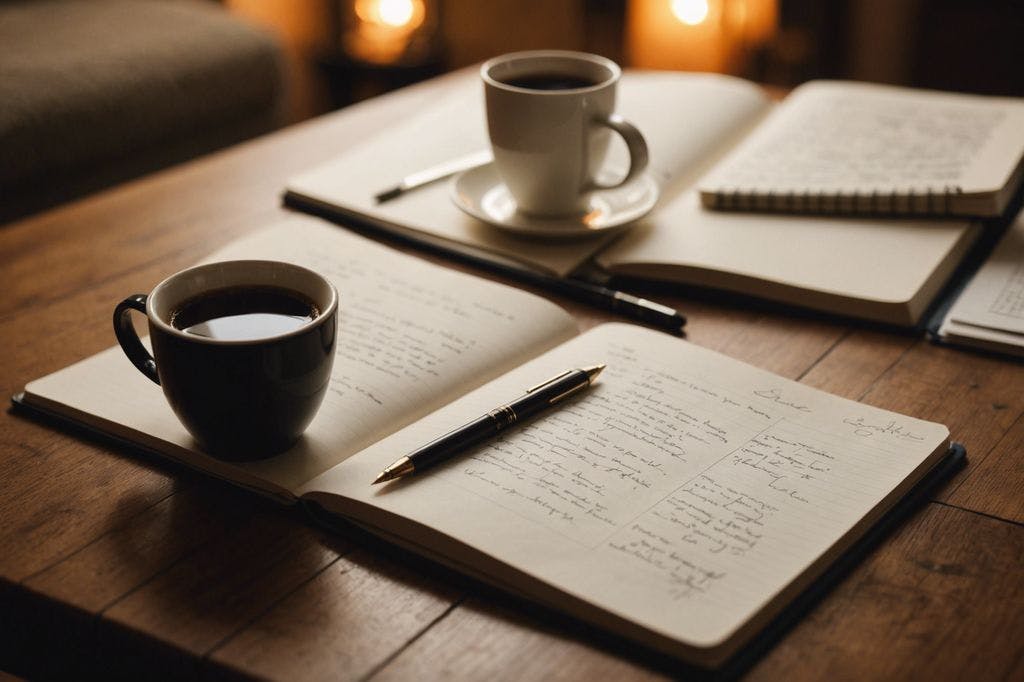
Essay Tips: Strategies for Writing Mastery
Elevate your essay writing with expert tips on analysis, thesis crafting, and impactful structure..

Master the art of crafting a good hook with our guide. Create compelling openers for a memorable first impression.

How to Write Critical Thinking Essay: Expert Tips
Expert tips for writing a critical thinking essay. learn how to structure, choose topics, and use evidence effectively.'.
How to Write a Hook that Captivates Readers

A hook is a compelling opening sentence or paragraph in an essay or article. Its purpose is to grab the readers’ attention and entice them to continue reading. A hook must evoke an emotional response or pique curiosity to keep the readers engaged.
Are you trying to figure out how to write a hook? Stick around because this blog has all the guidelines you need to write one like an expert paper writing service provider. So, let’s get started!
Table of Contents
Types of Hooks for Essays
Your essay or research paper’s hook can be in any of the five types:
Anecdotal Hook
Starting with an anecdote is a good way to keep the readers interested. Ensure that the anecdote relates to your topic and makes your readers feel like they’re part of the narrative.
For example:
“Sarah sat at the edge of the cliff. The wind whipping through her hair as she stared into the vast expanse of the Grand Canyon. Little did she know that this moment would be the catalyst for a life-changing decision.”
This hook introduces a character, Sarah, and a dramatic setting, the Grand Canyon. Doing so creates intrigue and leaves readers wondering about Sarah’s decision. Here, the reader is immediately invested in the story and eager to learn more.
Question Based Hooks
Another effective hook is to pose thought-provoking questions. This type of hook encourages readers to engage with the content right from the start actively.
Here’s an example:
“What if everything you thought you knew about success was wrong? What if the key to achieving true fulfillment lies in embracing failure and redefining your definition of success?”
This hook presents a series of thought-provoking questions challenging the conventional wisdom about success.
Statistical or Factual Hook
This hook type is particularly effective when the statistic or fact is relevant to the main content.
“Did you know that 80% of New Year’s resolutions fail by February? Discover the secrets to making lasting changes and achieving your goals beyond the first month of the year.”
This hook uses a surprising statistic about the failure rate of New Year’s resolutions to capture readers’ attention. It entices readers to continue reading to uncover shared strategies and insights.
Witty or Humorous Hooks
Humor and wit can be great ways to keep your readers interested and make their reading experience more enjoyable. If the content is funny or lighthearted, this kind of hook can grab people’s attention.
“They say the early bird catches the worm, but what about the night owls? Discover the surprising advantages of embracing your nocturnal nature and redefining productivity on your own terms.”
This hook puts a fun spin on a well-known phrase about night owls and productivity.
Scenario Based Hook
This kind of hook appeals to their senses and feelings, establishing an instant bond.
“The sun dipped below the horizon, casting a warm, golden glow over the tranquil beach. As the waves gently lapping against the shore, a sense of peace and possibility filled the air. Beckoning those who dared to chase their dreams!
This hook paints a picture of a beautiful beach at sunset, creating a sense of tranquility and motivation. It provides a vivid image full of detail that draws readers in and captures their imaginations.
Understanding How to Write a Killer Hook
A hook is like a doorway to your content. It sets the tone for establishing a connection with your readers.
It can be a stirring statement, an interesting question, an amusing anecdote, or a shocking fact.
Why is a Strong Hook Crucial in Capturing Readers’ Interest?
Having an eye-catching hook can be a major game-changer when grabbing people’s attention. It’s like a magnet, luring them in and making them want to read your writing.
If you don’t have a good hook, people might not stick around to hear what you have to say. Moreover, a strong hook also sets the tone for your entire writing.
Examples to Understand the Impact of a Strong Hook
Compelling Statement:
“In today’s busy world, have you ever thought about how you can get more done in a shorter amount of time?”
This hook immediately grabs readers’ attention by talking about a common problem. It plays on people’s need to be more efficient and leaves them wanting to find the solution.
Thought-Provoking Question
“What if the key to happiness lies not in acquiring more, but in letting go?”
This hook gets people thinking by asking a thought-provoking question that goes against the grain. It makes readers question their own opinions and views. Luring them in to see what kind of answers the piece offers.
Intriguing Anecdote
“As the clock struck midnight, she found herself standing on the edge of a decision that would change her life forever.”
This hook straight away pulls readers into a dramatic scenario. Trying to spark their curiosity about the character’s problem. Makes them desperate to find out the results of their choice.
Surprising Fact
“Did you know that the human brain can process images 60,000 times faster than text?”
This hook throws out an unexpected and captivating fact that gets readers interested. It brings up an interesting piece of info. Also gives a hint at what more can be discovered in the rest of the article.
Pro Tips to Craft a Killer Hook
You can use the following techniques to write a killer hook.
Target Audience – Identification, Preference, and Interest
Before you write a hook, it’s important to understand your audience well.
To identify your target audience, consider the following factors:
- Demographics: Age, gender, location, education level, occupation, etc.
- Psychographics: Values, beliefs, hobbies, lifestyle choices, etc.
- Behavior: Online habits, preferred platforms, browsing patterns, content consumption habits, etc.
Understanding Target Audience Preferences and Interests
After identifying your audience, it is important to know their interests. Here are some guidelines from the expert research paper writing services provider.
Surveys and Questionnaires
Send out surveys to your audience to get their thoughts and feelings directly. Ask what they like, what interests them, and what captures their attention. Look at the answers you get to find out what people usually think.
Social Media Listening
Keep an eye on social media sites where your desired demographic hangs out. Check out what they’re interacting with, what they’re talking about, and the kind of lingo they use.
Effective Hook for Effective Writing
Once you’ve figured out what your audience likes and dislikes, you can craft a hook that resonates with your audience. Here are a few ideas to help you do that while writing an essay:
Pinning the Pain Points
Identify the challenges, problems, or pain points your audience faces and address them directly in your hook. For example, “Tired of struggling to find time for self-care? Discover a simple solution that fits into your busy schedule.”
Appeal to Their Aspirations
Tap into your audience’s aspirations, goals, or desires and use them to create an emotional connection. For instance, “Imagine a life filled with adventure and travel. Uncover the secrets to fulfilling your wanderlust dreams.”
Use Their Language
Pay attention to the language, phrases, and terminology your audience uses. Incorporate those words in your hook to make it relatable and resonate with their communication style.
Focus on Relevancy
Ensure that your hook directly relates to the topic or content you’re offering. Make it clear how your content will provide value or satisfy their interests. For instance,
“Discover the latest fashion trends that suit your body type perfectly.”
Create Curiosity
Intrigue your audience by hinting at valuable insights or solutions they can expect to find in your content. Pose a question or make a statement that sparks their curiosity and leaves them wanting more.
Impactful Hook for a Perfect Write-up
Stick to these guidelines below for writing an effective hook:
Keep Your Opening Sentence Concise
The first line of your hook matters in getting people to pay attention. Keep it short, powerful, and interesting right away. Don’t waste time with long intros or too much background info. Drop a punchy sentence that sets the tone for the rest of your content.
Consider the following example:
“Unravel the mysteries of the universe in just five simple steps.”
Creating a Sense of Curiosity or Suspense
Creating intrigue can capture your readers’ attention and keep them hooked. Think of it like this: curiosity and suspense are like bait to draw people in.
For example, you could open with a question or Statement that will make your readers want to know more. Or you could set up a scene that creates a sense of anticipation for what comes next.
“She stood at the crossroads, a single decision separating her from the life she had always dreamed of.”
This opening sets up a suspenseful situation. Makes readers eager to find out what choice the character will make and what the consequences will be.
Add Emotions to Evoke a Strong Reaction:
Feelings resonate with readers and get an intense response. By tapping into people’s emotions, you can create an instant link and interest.
“Heart pounding, palms sweating, she took a deep breath and stepped onto the stage. It was her moment to shine.”
It creates an emotional connection and builds anticipation as readers root for the character to do well. Stirs up many feelings and encourages readers to continue reading to find out what happens next.
Key Ingredients of a Good Hook
While writing a hook, ensure:
Clarity and Conciseness
Make sure the hook is simple and to the point. Cut out any extra words that could weaken its effects.
Emotional Appeal
See if the hook gets the emotions out of the readers you want. Think about adding or making the elements stronger to get the readers feeling something.
Relevance and Connection
Make sure the hook is closely connected to the rest of the article. Tweak the hook to strengthen the link between the start and the rest of the text.
Language and Tone
Be mindful of the words you use, how you say it, and the type of writing in the hook. Try to make sure it’s something that your target audience will like and expect.
Common Mistakes to Avoid
Overly long or complicated hooks.
Avoid making a hook statement overly long. Long and convoluted hooks for writing can confuse or overwhelm readers. As a result, they will lose interest before they dive into the main content.
Using Clichés or Generic Openings
Using clichés or generic openings in your hook can make it predictable and uninteresting. Generic openings fail to capture readers’ attention because they offer nothing new or intriguing.
“Once upon a time, in a land far, far away, there lived a brave hero who embarked on an epic journey to save the world from evil.”
This opening might sound familiar and reminiscent of classic fairy tales. Still, it doesn’t provide any unique or surprising elements.
To avoid clichés and generic openings, strive for originality and fresh perspectives. Here’s a revised hook that takes a different approach:
“In the darkest corners of a forgotten realm, a reluctant outcast discovers an ancient secret that holds the power to reshape destiny.”
Failing to Deliver on the Promises Made in the Hook
When readers are hooked by an intriguing statement or a compelling question, they expect the content to deliver on those promises. Failing to do so can lead to disappointment and a loss of trust.
Ensure that the hook in essay accurately reflects the main content and sets realistic expectations for readers. Here’s an example:
“Discover the ultimate secret to becoming a millionaire in just one month!”
If the content that follows this hook doesn’t provide a legitimate and achievable path to wealth creation, readers will feel misled and may lose interest. While writing hooks, ensure that the hook’s promises align with the content and deliver valuable information or insights.
Writers need to use a catchy hook in their write-ups. It is like setting the tone for your entire piece, and it can create an emotional connection between you and your readers.
Hopefully, this blog post helped let you know how to write a hook for an essay. If you are still confused, don’t hesitate to count on the professional expertise of our writers .
What is the purpose of hooks in writing?
How can i make my hook more captivating.
To grab people's attention with your hook;
- Stir up the reader's curiosity
- Paint a vivid picture in their mind
- Ask questions that make them think and say something that piques their interest
- keep tweaking until you get the perfect hook!
How do I ensure my hook is relevant to my content?
Order Original Papers & Essays
Your First Custom Paper Sample is on Us!
Timely Deliveries
No Plagiarism & AI
100% Refund
Try Our Free Paper Writing Service
Related blogs.

Connections with Writers and support
Privacy and Confidentiality Guarantee
Average Quality Score
Writers' Center
Eastern Washington University
Writing Your Paper 2: Drafting: Creating a Hook
- Creating a Hook
- Transitions
- Formal Writing
- Point of View
Any of These Can Create a Good Hook
An introduction should hook, or engage, readers and give them some insight into where you'll take them. The first sentence or two of your first paragraph set the tone for the entire piece. Here are some ideas for a strong start:
- Lead with a quotation that is provocative or well-phrased.
- Historical/Bibliographical Review – give context and background.
- Review the Controversy – involve your reader in the battle or issue you will be addressing.
- From the General to the Specific (inverted triangle) – begin with a broad situation, concept, or idea, and narrow the focus to your purpose statement/thesis.
- Begin with an anecdote or illustration – capture the audience’s imagination and interest with a story that sets the stage for your argument.
- Ask questions – place your reader in an active role.
- State your thesis/point right off the bat.
- Present a paradox – begin with an assumption that readers accept as true and lead into a claim that not only challenges that assumption but may very well seem paradoxical.
- Minding the gap introduction – call the audience’s attention to a gap in the research or subject matter; promise that you will fill in the gap. You can also identify what readers know and then what they don’t know (or what you believe they need to know).
One of the best ways to practice writing a hook is to "imitate" the way others start their pieces. Take a look at your favorite news source or blog (you could try the New York Times blogs or The Millions ) and try some of the writers' strategies (without directly copying their hooks, of course!).
[ Back to resource home ]

[email protected] 509.359.2779
Cheney Campus JFK Library Learning Commons
Stay Connected!
inside.ewu.edu/writerscenter Instagram Facebook
- Next: Structure >>
- Last Updated: May 16, 2024 11:05 AM
- URL: https://research.ewu.edu/c.php?g=53658
How to Write a Hook: Start Off Your Essay Strong with This Guide

What is a Hook for an Essay: Importance and Purpose
Which section of your essay can make your readers dip their toes into your writing? Is it the body paragraphs where all the analysis is laid out? Or maybe the introduction, where you present your thesis statement and voice your perspective on the subject? Well, if you think it is the latter, then we must agree with your decision. However, let's get more specific; if we take the introductory paragraph to pieces, which piece gets the most recognition? You must have guessed from the article's title that we're talking about a hook. But first, let's define what is a hook for an essay before we walk you through the reasons why it deserves our pat on the back.
The hook is the initial sentence in a written work. Whether you're asking how to write a hook for a song, blog post, or term paper, know that the purpose of any effective hook is to seize the reader's attention. It can be one sentence long, often for shorter pieces, or composed of several lines - usually for larger pieces. Making the reader want to keep reading is what an essay hook accomplishes for your paper, just as an intriguing introduction does for any piece.
Our main emphasis in this guide is on creating a good hook for an essay. Nonetheless, these fundamental guidelines apply to nearly every format for communicating with your audience. Whether writing a personal statement, a speech, or a presentation, making a solid first impression is crucial to spur your readers into action.
How to Write a Hook for Different Kinds of Writing
Although it is a tough skill to master, understanding how to write a hook is crucial for academic writing success. By reviewing the most prevalent kinds of essay hooks, you can discover how to effectively captivate readers from the start and generate a hook that is ideal for your article. To do so, let's head over to the following sections prepared by our dissertation writers .
%20(1).webp)
How to Write a Hook for a College Essay?
By mastering how to write a hook for a college essay, you have the opportunity to stand out from the hundreds of applicants with identical academic portfolios to yours in your college essay. It should shed light on who you are, represent your true nature, and show your individuality. But first, you need an attention-grabbing start if you want the admissions committee to read more of yours than theirs. For this, you'll require a strong hook.
Set the Scene
When wondering how to write a good hook for an essay, consider setting the scene. Open in the middle of a key moment, plunge in with vivid details and conversation to keep your essay flowing and attract the reader. Make the reader feel like they are seeing a moment from your life and have just tuned in.
Open with an Example
Starting with a specific example is also a great idea if you're explaining how you acquired a particular skill or unique accomplishment. Then, similar to how you established the scenario above, you may return to this point later and discuss its significance throughout the remaining sections.
Open with an Anecdote
Using an anecdotal hook doesn't necessarily mean that your essay should also be humorous. The joke should be short and well-aimed to achieve the best results. To assist the reader in visualizing the situation and understanding what you are up against when tackling a task or overcoming a challenge, you might also use a funny irony. And if this sounds too overwhelming to compose, buy an essay on our platform and let our expert writers convey your unmatched story!
How to Write a Hook for an Argumentative Essay?
If you write a strong hook, your instructor will be compelled to read your argument in the following paragraphs. So, put your creative thinking cap on while crafting the hook, and write in a way that entices readers to continue reading the essay.
Use Statistics
Statistics serve as a useful hook because they encourage research. When used in argumentative writing, statistics can introduce readers to previously undiscovered details and data. That can greatly increase their desire to read your article from start to finish. You can also consider this advice when unsure how to write a good hook for a research paper. Especially if you're conducting a quantitative study, a statistic hook can be a solid start.
Use a Common Misconception
Another answer to your 'how to write a hook for an argumentative essay' question is to use a common misconception. What could be a better way to construct an interesting hook, which should grab readers' attention, than to incorporate a widely held misconception? A widespread false belief is one that many people hold to be true. When you create a hook with a misinterpretation, you startle your readers and immediately capture their interest.
How to Write a Hook for a Persuasive Essay?
The finest hooks for a persuasive essay capture the reader's interest while leading them to almost unconsciously support your position even before they are aware of it. You can accomplish this by employing the following hook ideas for an essay:
Ask a Rhetorical Question
By posing a query at the outset of your essay, you may engage the reader's critical thinking and whet their appetite for the solution you won't provide until later. Try to formulate a question wide enough for them to not immediately know the answer and detailed enough to avoid becoming a generic hook.
Use an Emotional Appeal
This is a fantastic approach to arouse sympathy and draw the reader into your cause. By appealing to the reader's emotions, you may establish a bond that encourages them to read more and get invested in the subject you cover.
Using these strategies, you won't have to wonder how to write a hook for a persuasive essay anymore!
How to Write a Hook for a Literary Analysis Essay?
Finding strong essay openers might be particularly challenging when writing a literary analysis. Coming up with something very remarkable on your own while writing about someone else's work is no easy feat. But we have some expert solutions below:
Use Literary Quotes
Using a literary quote sounds like the best option when unsure how to write a hook for a literary analysis essay. Nonetheless, its use is not restricted to that and is mostly determined by the style and meaning of the quotes. Still, when employing literary quotes, it's crucial to show two things at once: first, how well you understand the textual information. And second, you know how to capture the reader's interest right away.
Employ Quotes from Famous People
This is another style of hook that is frequently employed in literary analysis. But if you wonder how to write a good essay hook without sounding boring, choose a historical person with notable accomplishments and keep your readers intrigued and inspired to read more.
How to Write a Hook for an Informative Essay?
In an informative essay, your ultimate goal is to not only educate your audience but also engage and keep them interested from the very beginning. For this, consider the following:
Start with a Fact or Definition
You might begin your essay with an interesting fact or by giving a definition related to your subject. The same standard applies here for most types mentioned above: it must be intriguing, surprising, and/or alarming.
Ask Questions that Relate to Your Topic
Another solution to 'How to write a hook for an informative essay?' is to introduce your essay with a relevant question. This hook lets you pique a reader's interest in your essay and urge them to keep reading as they ponder the answer.
Need a Perfect Article?
Hire a professional to write a top-notch essay or paper for you! Click the button below to get custom essay help.
Expert-Approved Tips for Writing an Essay Hook
Are you still struggling with the ideal opening sentence for your essay? Check out some advice from our essay helper on how to write a hook sentence and make your opening stand out.
.webp)
- Keep your essay type in mind . Remember to keep your hook relevant. An effective hook for an argumentative or descriptive essay format will differ greatly. Therefore, the relevancy of the hook might be even more important than the content it conveys.
- Decide on the purpose of your hook . When unsure how to write a hook for an essay, try asking the following questions: What result are you hoping to get from it? Would you like your readers to be curious? Or, even better, surprised? Perhaps even somewhat caught off guard? Determine the effect you wish to accomplish before selecting a hook.
- Choose a hook at the end of the writing process. Even though it should be the first sentence of your paper, it doesn't mean you should write your hook first. Writing an essay is a long and creative process. So, if you can't think of an effective hook at the beginning, just keep writing according to your plan, and it will eventually come into your head. If you were lucky enough to concoct your hook immediately, double-check your writing to see if it still fits into the whole text and its style once you've finished writing.
- Make it short . The shorter, the better – this rule works for essay hooks. Keeping your hook to a minimum size will ensure that readers will read it at the same moment they start looking at your essay. Even before thinking if they want or don't want to read it, their attention will be captured, and their curiosity will get the best of them. So, they will continue reading the entire text to discover as much as possible.
Now you know how to write a good hook and understand that a solid hook is the difference between someone delving further into your work or abandoning it immediately. With our hook examples for an essay, you can do more than just write a great paper. We do not doubt that you can even write a winning term paper example right away!
Try to become an even better writer with the help of our paper writing service . Give them the freedom to write superior hooks and full essays for you so you may learn from them!
Do You Lack Creative Writing Skills?
This shouldn't stop you from producing a great essay! Order your essay today and watch your writing come alive.
What Is A Good Hook For An Essay?
How to write a hook for an essay, what is a good hook for an argumentative essay.

is an expert in nursing and healthcare, with a strong background in history, law, and literature. Holding advanced degrees in nursing and public health, his analytical approach and comprehensive knowledge help students navigate complex topics. On EssayPro blog, Adam provides insightful articles on everything from historical analysis to the intricacies of healthcare policies. In his downtime, he enjoys historical documentaries and volunteering at local clinics.

Related Articles
%20(3).webp)
How To Write An Essay
Hook Examples

200+ Creative Hook Examples: Ready, Set, Hook
27 min read
Published on: Mar 22, 2023
Last updated on: Jan 30, 2024

People also read
How To Write An Essay - "The Secret To Craft an A+ Essay"
Learn How to Title an Essay Like a Professional Writer
How to Write an Essay Outline Like a Pro
Essay Format - An Easy Guide & Examples
What is a Thesis Statement, and How is it Written? - Know Here
Arguable and Strong Thesis Statement Examples for Your Essay
A Guide to Writing a 1000 Word Essay for School or College
All You Need to Know About a 500-word Essay
Different Types of Essay: Definition With Best Examples
Writing an Essay Introduction - Step by Step Guide
Transition Words for Essays - An Ultimate List
Jumpstart Your Writing with These Proven Strategies on How to Start an Essay
Learn How to Write a Topic Sentence that Stands Out
A Guide to Crafting an Impactful Conclusion for Your Essay
Amazing Essay Topics & Ideas for Your Next Project (2024)
Explore the Different Types of Sentences with Examples
Share this article
As a student, you know how important it is to grab your reader’s attention right away.
Stories without strong starts can leave readers feeling uninspired and bored—and that's not what we want! After all, compelling stories require creative hooks to seal the deal.
That's why we're here!
To avoid a bland start, it's important to craft a clever and memorable hook. With the use of effective hooks, you can leave a lasting impression on even the most discerning of readers.
Join us now as we jump into different types of hooks, from intriguing questions to vivid imagery – let's get started!
On This Page On This Page -->
Question Hook Examples
If you're stuck in the creative hook-writing process, a question hook can be your go-to.
Questions hook readers and make them think about whatâs being asked. You can also use a fact statistic too.
They also immediately draw attention to the topic at hand and make readers more likely to continue reading.
Let's look at some examples :
- "What if I told you that a single dream could change your life?"
- "Who can inhabit a place where the past and the present intersect?"
- "How would you respond if you had to choose between love and ambition?"
- "Where does one draw the line between passion and obsession?"
- "Can humanity survive in a world of conflicting values?"
- "What if our dreams became reality?" - John Steinbeck
- "How do you explain something that cannot be explained?"
- "Is it possible to find true love in an imperfect world?"
- "Do we control our destiny, or does fate have a hand in it?"
- "How much can power corrupts us before we become monsters?"
Statistic Hook Examples
Numbers don't lie, and sometimes they can be the most powerful way to make a point.
Here are some examples of statistic hooks that can grab your readers' attention:
- "Did you know that over 50% of adults in the United States are single?"
- "According to recent studies, over 70% of high school students report feeling overwhelmed and stressed on a daily basis."
- "In the United States, the average household debt is over $90,000."
- "Over 80% of Americans believe that climate change is a serious problem, but what are we doing to address it?"
- "According to recent polls, only 20% of Americans trust the government to do what is right always or most of the time."
- "In the last decade, the use of social media has skyrocketed, with over 3 billion users worldwide."
- "Studies show that women still earn only 82 cents for every dollar earned by men in the United States."
- "Over 40% of food produced in the United States is wasted each year, while millions of people go hungry."
- "Recent research has found that over 90% of plastic waste in the ocean comes from just 10 rivers in Asia and Africa."
- "Despite advances in medical technology, the United States has one of the highest rates of maternal mortality in the developed world, with over 700 deaths per year."
Metaphor / Simile Hook Examples
Metaphors and similes can be powerful tools for engaging your reader and making your writing more vivid.
Here are ten examples to inspire your own metaphorical hooks.
- "Like a beacon in the night, [topic] shines a light on our deepest hopes and fears."
- "Metaphorically speaking, [topic] is a Pandora's box of complex emotions and ideas that challenge us to confront our own biases and assumptions."
- "Just as a ship navigates treacherous waters, [topic] requires a steady hand and a clear sense of direction to navigate successfully."
- "In many ways, [topic] is a mirror that reflects the beauty and complexity of the human experience."
- "Like a puzzle with countless pieces, [topic] invites us to piece together disparate elements to uncover deeper truths and insights."
- "Metaphorically speaking, [topic] is a garden that requires careful tending and nurturing to flourish."
- "Just as a painter uses color and light to create a masterpiece, [topic] allows us to paint a vivid portrait of the world around us."
- "In many ways, [topic] is a labyrinth that challenges us to explore its winding paths and discover hidden treasures along the way."
- "Like a key that unlocks a door, [topic] gives us access to new worlds of knowledge and understanding."
- "Metaphorically speaking, [topic] is a journey that takes us on a winding path through the highs and lows of the human experience."
Anecdote Hook Examples
If you want to hook your readers from the start with a narrative that's more fun and lighthearted, an anecdote hook is a way to go.
Let's look at some examples:
- "It all started when I decided to take a walk in the woods one summer day..."
- "The night began as any other night out with my friends - until the police showed up..."
- "The day I found out my grandmother had cancer was one of the saddest days of my life"
- "It was a sunny Sunday afternoon when I decided to take a chance and go for a drive on an unfamiliar road"
- "I never expected that one day I'd be standing in the World Cup final..."
- "It was summertime, and all my friends were out at the beach while I was stuck inside baking cookies"
- "I remember the day I finally decided to take a leap of faith and start my own business"
- "My first day at university was filled with anxiety and excitement"
- "That's when I realized I wanted to be a teacher - when I saw the look on my student's faces after they finally understood something"
- "My first time walking into a yoga class was nerve-wracking, but it ended up being one of the best decisions of my life"
Quote Hook Examples
If you want to hook your readers right away with a strong introduction, using a quote hook can be an effective strategy.
Let's look at some examples of a quote from a famous person.
- "We are all in the gutter, but some of us are looking at the stars" - Oscar Wilde
- "To infinity and beyond!" - Buzz Lightyear
- "You miss 100% of the shots you don't take" - Wayne Gretzky
- "If you can dream it, you can do it" - Walt Disney
- "It is our choices that show what we truly are, far more than our abilities" - J.K. Rowling
- "You can't calm the storm, so stop trying. What you can do is calm yourself" - Tim Berners-Lee
- "The only way to do great work is to love what you do" - Steve Jobs
- "A journey of a thousand miles begins with a single step" - Lao Tzu
- "Life is what you make it" - Anonymous
- "The best way to predict the future is to create it" - Abraham Lincoln
Story Hook Examples
If your main goal is to fully captivate and engage readers in an unforgettable story, then a well-crafted story hook is the way to go.
- "It all started on a cold January night with a phone call that changed my life..."
- "The moment I saw my best friend in that hospital bed, I knew everything would never be the same again..."
- "I had been dreaming of this day for years - the day I'd finally get to explore the world outside of my small town..."
- "The sun was just setting as we drove through the old neighborhood, remembering all the good times we had growing up..."
- "I opened my front door to find a man standing in the hallway with a strange package - and that's how it all began..."
- "The morning of my eighteenth birthday, I woke up feeling strangely different - like an adventure was about to begin..."
- "I remember the day I decided to face my fears and take a leap of faith - that's when everything changed..."
- "The night I saw the shooting stars were like nothing I had ever experienced before, and I knew it would stay with me forever..."
- "It took one coincidence for me to realize that life was about to take me on a wild ride..."
- "I had never felt so brave in my life when I decided to take a stand and fight for what I believed in..."
Hook Examples For Essay
If you desire to seize your reader's attention and keep them enthralled in your essay, a persuasive hook is essential.
Check out these hooks for essays examples:
- "The world we live in today has changed drastically since the introduction of technology"
- "Every generation has had its own unique set of challenges - and the current generation is no exception"
- "We can learn a lot from history and the mistakes that have been made in the past"
- "Society often puts a label on things without really understanding them or giving them a chance"
- "The power of technology can be both a blessing and a curse"
- "Education is the key to success - and it's important for everyone to have access to it"
- "What would life be like without our modern-day conveniences?"
- "We all have our own unique perspectives, but sometimes we forget to look at the bigger picture"
- "Not everything is as it seems - sometimes we have to dig deeper to understand the truth"
- "Life is a journey, not a destination - and every step of the way holds valuable lessons to be learned"
Narrative Hook Examples
Narrative hook examples are a great way to engage your reader in your story. Here are some examples of hooks for a narrative essay :
- "It was a dark and stormy night, and I heard something outside my window..."
- "I had been waiting for this moment my whole life, and finally it was here..."
- "I had no idea what I was getting myself into when I opened that door..."
- "The air around me suddenly changed, and a chill ran down my spine as I realized how alone I was..."
- "It had been years since we'd seen each other, and now I was standing face to face with my old enemy..."
- "I followed the faint light until I stumbled upon a mysterious room with an unknown secret inside..."
- "It began as a normal day, but by nightfall, it was like nothing I'd ever experienced before..."
- "The cold wind was howling as I made my way across the deserted desert, searching for something greater..."
- "As I stepped through the ruins of the long-abandoned castle, I could feel an eerie presence watching me..."
- "The clock struck midnight and suddenly everything changed - it felt like a new world had been born..."
Argumentative Essay Hook Examples
Argumentative hook examples can be a great tool to draw readers in and engage them with an argumentative essay .
Let's look at some hook examples for argumentative essay:
- "The world we live in today is drastically different from what it used to be - and much of this change has been caused by technology"
- "Every generation has its own set of challenges, and the current generation is no exception"
- "We should always be willing to learn from history and the mistakes that have been made in the past"
- "Society often judges things without really understanding them or giving them a chance"
- "The power of technology can be both a blessing and a curse - we must find the balance"
- "Education is essential to success, but not everyone has access to it"
- "We all have our own unique perspectives, but we must consider the greater good"
- "Sometimes things are not as they seem - it's important to look at all sides of an issue"
- "Life is full of lessons - and it's impossible to learn them all in one lifetime"
College Essay Hook Examples
Crafting an effective hook for a college essay is essential to grab your reader's attention and draw them into the story.
College hook examples can serve as invaluable guides when creating this crucial element of any composition.
Check out some examples:
- "The journey of life has taken me down many paths, but never in my wildest dreams did I imagine it would lead me here"
- "My story is not a traditional one, but it's uniquely mine and I'm ready to make my mark"
- "When I think back to the decisions that have shaped my life, this one stands out as the most important"
- "I had no idea how much I could learn from taking a leap of faith and going outside my comfort zone"
- "From the age of four, I knew that I wanted to be a doctor - and here I am on the brink of making it happen"
- "I wasn't always the most successful student, but I never gave up and now I'm ready to prove what I can do"
- "A person's future isn't predetermined - I'm determined to make mine a success"
- "Education is power, and I'm ready to take hold of my own destiny"
- "It's not about where you come from, but what you can achieve with hard work and dedication"
- "Life is unpredictable, but I'm ready to face any challenge that comes my way"
Hook Examples For Speech
Speech hook examples provide a great way to hook your audience into your speech .
Here are some examples:
- "We've all heard the phrase 'knowledge is power', but what does that really mean?"
- "What would our lives be like if we weren't as connected to technology as we are today?"
- "The world is a vast and mysterious place - let's explore how different cultures live and think"
- "What can we learn from the mistakes of our ancestors? Let's find out!"
- "We've heard about climate change, but what can we actually do to help?"
- "We live in a world of opportunity - let's explore how we can make the most of it"
- "Everyone has a story to tell - let's discover what makes us unique and wonderful"
- "Hard work and dedication are key ingredients for success - let's learn how to make the most of them"
- "Let's talk about what it means to make a difference in our world, and how we can do it!"
- "We all have the potential to reach our goals - let's find out how!"
Hook Examples For Expository Essays
An expository essay provides a great way to engage your reader in your writing. Here are some examples:
- "We often take for granted the little things in life - let's explore why they are so important."
- "What lies beneath the surface of our world? Let's look deeper and find out!"
- "Our environment is rapidly changing - let's see what we can do to protect it."
- "What causes people to make bad decisions? Let's explore the psychology behind it."
- "Without laws, society would be chaos - let's look at how laws keep us safe."
- "What can we learn from history? Let's uncover the lessons of our past."
- "Fear is an inevitable part of life - let's examine how to conquer it."
- "Our minds are incredibly powerful - let's explore the potential of our thoughts."
- "Life can be unpredictable, but how do we handle it? Let's discover some strategies."
- "What is the meaning of success? Let's define it and work towards achieving it!"?

Paper Due? Why Suffer? That's our Job!
Hook Examples For Compare And Contrast Essay
When writing a compare and contrast essay, it's important to have strong hooks.
Here are some examples of hooks that you can use for your compare-and-contrast essay :
- "They say that 'opposites attract,' but do they really?"
- "If you think two things can't be more different, think again."
- "You might be surprised to learn that two seemingly similar things can have vast differences."
- "Have you ever wondered what makes two things that seem identical actually very different?"
- "There are many similarities between X and Y, but there are also key differences that make them stand out."
- "Are you struggling to choose between two options that seem equally appealing?"
- "At first glance, it may seem like two things have nothing in common."
- "They say that variety is the spice of life, but is it always better?"
- "It's easy to get lost in the details, but sometimes all we need is a little comparison to see things clearly."
- "They say that everything is relative, but is that really true?"

Hook Examples For Research Papers
Crafting an effective research hook can be a powerful way to draw your readers into the world of your paper.
Examples can provide excellent guidance when crafting this important part of any academic work!
Let's look at some hook examples in writing that can help you with your research paper :
- "Many people believe that X is the answer, but what does the research say?"
- "We've all heard about Y, but how does it actually work?"
- "What can we learn from the mistakes of the past and how can we use that knowledge to move forward?"
- "How has technology changed the way we do research and what ethical considerations do we need to take into account?"
- "What are some of the implications of Z and what can we do to address them?"
- "The debate around A is growing - let's explore both sides and see where the research takes us"
- "We all have our own opinions on B, but what does the evidence tell us?"
- "Let's take a look at C and uncover what it really means"
- "What can we learn from examining the history of D and how can that help us in the present?"
- "There are many theories surrounding E - let's explore them and draw our own conclusions"
Hook Examples For Literary Analysis
Literary hook examples provide a great way to hook your readers into a literary analysis essay .
Let's look at some examples of a great hook sentence here!
- "What secrets do the characters in this story hold and what truths can we uncover?"
- "What does this piece of literature tell us about the human condition?"
- "What themes can we uncover by examining this text through a feminist lens?"
- "What is the author trying to say about society and how can we interpret it?"
- "How does this story stand out from others in its genre and what makes it unique?"
- "Let's explore the symbolism and imagery used in this piece of literature"
- "What message is the author trying to convey and how can that help us better understand the world we live in?"
- "The setting of this story plays an important role - let's examine it more closely"
- "How does the use of language in this text help to convey its themes and ideas?"
- "What can we learn about human nature by analyzing the characters in this story?"
Paragraph Hook Examples
Writing can be challenging, especially when it comes to crafting engaging openings. Here are ten hook ideas that might inspire your next paragraph:
- "We all have our guilty pleasures, whether it's binge-watching reality TV or devouring junk food."
- "Technology has transformed every aspect of our lives, from how we work and communicate to how we entertain ourselves."
- "History is full of fascinating stories and characters. Let's shine a light on the forgotten voices of the past."
- "Climate change is one of the most pressing issues of our time, but what can we do to address it?"
- "Language is a powerful tool for communication, but it can also be a source of confusion and misunderstanding."
- "The human brain is a mysterious and complex organ, capable of incredible feats of creativity and intelligence. Let's delve into the latest research on how our brains work."
- "Art has the power to inspire, challenge, and transform us. But what is it about certain works of art that make them timeless and universal?"
- "Identity is a complex and multifaceted concept, shaped by factors like race, gender, sexuality, and class."
- "Philosophy has been a source of inquiry and debate for centuries, but how can it help us navigate the complexities of modern life?"
- "Food is not just a source of sustenance, but a reflection of culture, history, and identity."
Query Letter Hook Examples
Query letter hook examples are a great way to engage your potential readers and agents.
- "This story will make you question everything you thought you knew."
- "Uncover an extraordinary tale of courage and determination."
- "Discover the power of hope in this heartfelt journey of transformation."
- "Follow a gripping story of passion and adventure."
- "Journey with a character on a quest to find the truth."
- "Experience an unforgettable tale of mystery and intrigue."
- "Meet a remarkable cast of characters in this stirring journey of discovery."
- "Go behind the scenes with a daring group of heroes."
- "Explore a world of mystery and wonder with a captivating story."
- "Be swept away in this thrilling adventure of courage and hope." ?
Hook Examples For Presentation
Presentation hooks are a remarkable way to captivate your audience and keep them engaged in your presentation. You can use interesting facts and statistic hooks as well!
With examples, you can create compelling stories or images that will make quite an impact!
- "We all know that X is important, but why is it so crucial to our lives?"
- "What can we learn from the successes and failures of Y?"
- "Let's explore how technology has changed the way we do Z and how that affects our lives"
- "What is the one thing we need to know about A in order to understand its significance?"
- "We've all heard about B, but what does it really mean for us?"
- "What are the implications of C and how can we use that knowledge to our advantage?"
- "Let's take a look at the history and evolution of D"
- "How does E affect our daily lives and what can we do about it?"
- "What are some of the potential benefits of F and what risks do we need to consider?"
- "What has been the impact of G on our society and how can we use it to make positive changes?"
Hook Examples For Introduction
Introduction hook examples provide a great way to make a strong statement.
- "Welcome to the world of X - let's dive in and see what it has to offer"
- "We all know Y, but why is it so important?"
- "What can we learn from the successes and failures of Z?"
- "Let's take a journey through the history of A and uncover its secrets"
- "How has technology changed the way we do C and what ethical considerations do we need to take into account?"
- "What are some of the implications of D and what can we do to address them?"
- "The debate around E is growing - let's explore both sides and see where the research takes us"
- "Let's examine the facts and uncover what F really means"
- "What can we learn from exploring the history of G and how can that help us in the present?"
Concluding Hook Examples
Writing a strong conclusion can be just as challenging as crafting an engaging opening. Here are closing hook examples that might help inspire you.
- "As we bring this discussion to a close, it's clear that [thesis statement]. But what are the implications of this insight for our lives and society as a whole?"
- "In the end, the examples we've explored illustrate the complexity and nuance of [topic]. But what does this mean for us moving forward?"
- "The evidence we've presented highlights the urgent need for [action or change]. So where do we go from here?"
- "As we wrap up this conversation, let's remember that [key takeaway or lesson]. How can we apply this insight to our own lives?"
- "The stories and characters we've examined offer a window into the human experience and our capacity for growth and transformation. What can we learn from their journeys?"
- "As we conclude this discussion, let's reflect on what this means for us as individuals and as a society."
- "The examples we've explored have shed light on the complexities and nuances of [topic]. But what are the broader implications of this understanding?"
- "As we come to the end of this essay, it's clear that [thesis statement]. But how can we use this knowledge to make a positive difference in the world?"
- "In conclusion, the evidence we've presented challenges us to rethink our assumptions about [topic]. Let's take this opportunity to broaden our perspectives and deepen our understanding."
- "As we close out this conversation, let's remember the power of human connection to heal and transform."
Hook Examples For Personal Statement
Crafting an attention-grabbing hook for your personal statement can be a great way to increase engagement and draw readers in.
Utilizing examples of successful hooks is an excellent strategy to help you create one that stands out!
- "How have my experience and values shaped who I am today?"
- "What makes me unique from other applicants and how can that help me succeed?"
- "How have my past experiences, both good and bad, helped me understand the importance of X?"
- "What do I know about Y that makes me stand out from other applicants?"
- "Let's explore how my skillset can help me achieve success in Z"
- "What have I learned from the people around me and how has that shaped my goals?"
- "In what ways can I use my knowledge of A to make a difference?"
- "How will B help me grow as an individual and achieve my dreams?"
- "What have I learned through C that has helped me become a better person?"
- "What can I offer that makes me the ideal candidate for this role?"
Catchy Hook Examples
Captivating hook examples are an excellent way to grab your readers' attention and entice them into the content.
- "Are you ready for X? It's time to find out!"
- "Discover the shocking truth about Y"
- "Let's uncover the hidden secrets of Z"
- "Unlock the power of A - it will blow your mind"
- "B will change your life - here's how to get started"
- "What does C mean for us? Let's find out!"
- "Are you ready to take on the challenge of D?"
- "Can E really change your life? Let's find out"
- "F can provide incredible opportunities - here's how to get started"
- "Discover the hidden potential of G - it will amaze you!"
Hook Examples For Romeo and Juliet Essays
Romeo and Juliet is one of the most iconic love stories in literary history. But what is it about this tragic tale that continues to captivate audiences centuries after it was written?
Here are some hook ideas that might inspire your essay:
- "What makes Romeo and Juliet one of the most enduring love stories of all time? Let's explore the themes and motifs that continue to captivate audiences today."
- "From sword fights to sonnets, Romeo and Juliet has it all. But what is it about Shakespeare's language and imagery that makes the play so memorable?"
- "Romeo and Juliet may seem like a straightforward story of love and tragedy, but what if there's more to it than meets the eye?"
- "The feud between the Capulets and Montagues may seem like a typical Shakespearean conflict. But what does it reveal about the tensions and rivalries of Renaissance-era Italy?"
- "What can Romeo and Juliet teach us about the power of passion and desire? Let's explore how the play challenges conventional morality and ethics."
- "Romeo and Juliet has been adapted countless times in popular culture, but what can we learn from the original play? Let's examine how Shakespeare's work continues to influence modern storytelling."
- "The tragic ending of Romeo and Juliet may seem predetermined, but what if the characters had made different choices? Let's explore the different paths the story could have taken."
- "Romeo and Juliet is often seen as a story of youthful passion, but what about the older characters in the play? Let's analyze the roles of Friar Lawrence and the Nurse in shaping the course of events."
- "Shakespeare's play may be set in Renaissance-era Italy, but its themes and motifs are universal. Let's examine how Romeo and Juliet speaks to contemporary issues and debates."
- "The balcony scene in Romeo and Juliet is one of the most iconic moments in all of literature, but what is it about this scene that makes it so powerful? Let's explore the language, imagery, and symbolism at play."
Hook Examples For Social Media
Social media has become a ubiquitous part of modern life, with billions of users around the world. But what is it about social media that has captured our attention and kept us hooked?
Here are some social media hook examples for you:
- "Social media is like a never-ending rabbit hole, with endless scrolling and new content to explore."
- "With social media, we have the power to connect with people from all over the world, but at what cost to our privacy and mental health?"
- "The rise of social media has transformed the way we communicate, but it has also created a new set of challenges for individuals and society as a whole."
- "From Instagram influencers to TikTok trends, social media has given rise to a whole new world of digital fame and fortune."
- "In the age of social media, we are more connected than ever before, but are we really communicating?"
- "What happens when the platform becomes a battleground for toxic behavior and hate speech?"
- "From Facebook to Twitter, social media has revolutionized the way we consume news and information."
- "Social media has made it easier than ever to connect with people who share our interests and passions."
- "With social media, we can curate the perfect image of ourselves and our lives. But is this curated image an accurate reflection of who we really are?"
- "Social media has opened up new opportunities for businesses and entrepreneurs."
Tips for Writing A Good Hook
A hook is the first sentence or phrase in your writing that captures your reader's attention.
A good hook is essential for any successful piece of writing, whether it's a novel, an essay, or a blog post.
Here are some tips for writing a good hook that will engage your readers and keep them interested:
- Start with an interesting fact or statistic: People love to learn new things. Starting with a surprising or little-known fact can be a great way to capture your reader's attention.
- Ask a thought-provoking question: Asking a question that challenges your reader's assumptions or beliefs can be a powerful way to hook them to thinking.
- Use descriptive language: Descriptive language can create a vivid picture in your reader's mind and draw them into your story or argument.
- Create a sense of urgency: If your writing is about a timely or important topic, creating a sense of urgency in your hook can be an effective way to grab your reader's attention.
- Start with a quote: A quote from a famous person or an expert in your field can lend credibility to your writing and pique your reader's interest.
- Share a personal anecdote: Sharing a personal story or experience can make your writing feel more relatable and human, and can help to build a connection with your reader.
Writing a hook for your essay can be a challenge, but with the right approach, you can create one that will capture your reader's attention.
If you're looking for some guidance to help you craft the perfect hook, CollegeEssay.org offers the best essay writing service to help you!
Stop wasting your time trying to craft the perfect hook and let CollegeEssay.org take care of it for you!
Enhance your writing skills by utilizing our essay writer AI . Take advantage of this valuable resource to improve your writing abilities.
Frequently Asked Questions (FAQs)
What is a hook example.
A hook example refers to an opening sentence of a piece of writing that is meant to grab the reader's attention and entice them to continue reading.
Good hooks may use descriptive words, strong verbs, vivid imagery, or engaging dialogue to draw readers in.
How can I come up with a good hook?
Coming up with a good hook requires that you know your audience and the purpose of your writing.
Consider what interests readers in this particular topic or area.Use that to create an engaging opening sentence that will pique their curiosity.
Barbara P (Literature, Marketing)
Barbara is a highly educated and qualified author with a Ph.D. in public health from an Ivy League university. She has spent a significant amount of time working in the medical field, conducting a thorough study on a variety of health issues. Her work has been published in several major publications.
Paper Due? Why Suffer? That’s our Job!

Keep reading

Legal & Policies
- Privacy Policy
- Cookies Policy
- Terms of Use
- Refunds & Cancellations
- Our Writers
- Success Stories
- Our Guarantees
- Affiliate Program
- Referral Program
- AI Essay Writer
Disclaimer: All client orders are completed by our team of highly qualified human writers. The essays and papers provided by us are not to be used for submission but rather as learning models only.
My Speech Class
Public Speaking Tips & Speech Topics
50+ Hook Examples: The Opening Lines That Make Your Essay Successful

Jim Peterson has over 20 years experience on speech writing. He wrote over 300 free speech topic ideas and how-to guides for any kind of public speaking and speech writing assignments at My Speech Class.

Writing a good paper starts with brainstorming a brilliant hook, which keeps your audience engaged with the text. There are many ways to formulate hooks, which will help your writing sound more original and compelling. Looking at some essay hook examples and tips on writing them is the first step to creating one of your own!
In this article:
What is a Hook?
Tips for creating a great hook, question hook examples, strong statement examples, fact/statistic hook examples, metaphor/simile hook examples, anecdotal hook examples.
A “hook” is a sentence that grabs the reader’s attention and keeps them interested in the outcome of your academic text or research paper. The hook is found in the first sentence or two in the opening paragraph in an academic text and serves both as an introduction and an attention grabber.
In literature, such sentences are often found in novels. A great personal favorite of mine is Christmas Carol’s first sentence: “Marley was dead: to begin with. ” This invites tons of interesting questions and piques your curiosity, making you want to read along.
We come across hook examples in our day-to-day lives, scrolling through YouTube video titles and website links. Clickbait can be considered the hook of the modern world, and there are tons of techniques to learn from it.
However, this article will focus on essay hooks for academic papers specifically. In the section below, we’ll be discussing tips on writing hook sentences and engaging your reader’s interest through a single opening sentence.
There are different types of hook sentences in an essay introduction. We’ll take a look at each type, and a few tips, so later on, you can start formulating your own essay hooks based on these few examples.
Can We Write Your Speech?
Get your audience blown away with help from a professional speechwriter. Free proofreading and copy-editing included.
- Question Hook: If you’re writing an art essay, philosophy paper, or business coursework, choosing a compelling and interesting question will leave the readers pondering throughout your text. The reader will automatically try to look for the answer within your research paper.
- Strong Statement: The opening lines can be controversial, a bold claim – the best hooks for argumentative essays are. This method can shock your audience, and they’ll be curious to learn how you defend your argument.
- Fact/Statistic Hook: These hook examples are used for scientific and academic assignments, allowing you to use a lesser-known fact or statistic which will grab the reader’s attention.
- Metaphor/Simile Hook: You can set up a scene by telling a short story for your readers to imagine before getting to your essay’s core. This metaphor hook can be highly compelling and relatable to your audience.
- Anecdotal Hook: The trickiest essay hook used to diffuse the tension surrounding a heavy topic. This tricky opening line should be carefully thought out and guaranteed to make the reader laugh and only used in the right circumstances.
If you’re using the fact/statistic hook, always make sure you quote a credible source. The same goes for the interesting facts hook type. Include those sources in the body of your essay.
It also helps to think of a hook you came across recently that made an impression on you. Was it a controversial blog post? A captivating personal story? A thesis statement that made you ponder?
Once you finish reading our article, it’s helpful to test your hook and introductory paragraph out to an audience. Have another student, tutor, or parent read it. See if it’s doing its purpose – is the reader engaged? What did they understand from your hook? Is the essay topic clear?
Don’t get discouraged if you don’t get it right the first time. Writing is a long process and requires a lot of rewriting. Take a small break and give it another go.
How to Write a Great Hook + Examples
There are two crucial points to follow when you write a hook:
- Keep your sentences short – don’t overstuff your sentences or let them run longer than two rows.
- Use simple, comprehensive language – the ultimate essay can be read and understood by anyone, even people outside your academic course.
It’s time to get to the examples!
- What if I told you the world has an unlimited energy resource?
- How much screen time is too much for elementary school children?
- Is online education the best way to learn in the middle of a pandemic?
- Did you know women are twice as likely to experience clinical depression than men?
- Are your evening habits keeping you from getting a good night’s sleep?
- Do jobs that require degrees have a higher earning potential?
- How important is it for YouTubers to use search engine optimization strategies?
- Will the consumption of meat products become a luxury in the year 2050?
- Has reading become more challenging due to our short attention span?
- Have you ever wondered why traffic builds up on no-stop roads?
- Why we should feel sorry for high achievers?
- Why you don’t need to be exceptional?
- How much sugar do you think you consume?
- The effects of global warming are irreversible, so what can we do to optimize our living now?
- Should fireworks be banned due to noise pollution and its effect on animals?
- Has television died in place for streaming services?
- Is our hatred of certain foods and flavors a direct result of our genetic heritage?
- Android app development will die out in the next twenty years.
- You’ll always marry the wrong person.
- Why is ordinary life not good enough anymore?
- Why are romantics ruining love?
- “The wicked tend to win” Machiavelli
- The hardest person in the world to break up with.
- Some imaginary friends can cultivate independence in a child.
- Did you know that space smells like seared steak?
- The human body houses 10 times more bacteria than it does cells.
- The longest war in the world is between the Netherlands and Sicily and here’s what happened.
- “A country that demands moral perfection in its foreign policy will achieve neither perfection nor security” H. Kissinger
- Cat purring can be beneficial to your health.
- There is a scientific explanation behind boredom.
- The average drunk driver drives under the influence more than 80 times before they get arrested for the first time.
- 1/3 of adults still sleep with a comfort toy in bed.
- The average American generates nearly 4.5 pounds of trash each day.
- The global rate for keeping good hygiene after using the toilet is 20%.
- Americans read for pleasure for less than 10 minutes every day.
- The average American eats around 13 pounds of ice cream each year.
- More than 1/2 million people experience homelessness each night.
- Approximately 90% of people who experience a cardiac arrest outside of hospitals die.
- Farmers and ranchers make up less than 2% of Americans.
- Approximately half of Americans will experience a mental illness during their lifetime.
- My cousin Joanna went to a party with red lipstick all over her teeth. I couldn’t help myself to tell her.
- I dressed up as a werewolf last Halloween. That’s when everything started.
- As a child my grandfather gave my grandma her favorite flower- a rose on every holiday. Does this kind of love still exist?
- Last year my parents dragged me to Paris six times. I had the most dreadful time – I just couldn’t understand how such a historic city can be so dirty, or why.
- The cause and effect example – when talking about the importance of safety, tell a story with an important moral.
- Imagine sitting by the fire with the love of your life…
- I have a four-year old baby – my publishing business I started in 2018.
- The picture of… brought back memories of…
- It’s difficult to talk about… because…
- If you were a famous person, would you…
- When I was 6, I was given a pet hamster for Christmas. Needless to say, little Zach is gone now, but I wonder how long he could have lived if I had been given it at 12?
- One reason I decided to switch to a healthy diet is… well it’s cheaper than buying a whole new set of clothes!
- I like talking to myself. Sometimes I have these seemingly clever and long conversations. I hardly have a clue what I’m talking about.
Mastering the hook sentence is something you might end up using in your day-to-day life, especially if you go into academia, publishing, or journalism as a career choice. But that’s not it – we use hooks to communicate on social media. The title of our blog post or recent youtube video are examples of well-formulated hooks. The quicker you start practicing them the easier they’ll become to use.
If you’re having any other academic trouble, like coming up with essay topics , or you want to learn the outlines of the different essay types, we can help you with that! You’ll become an essay writing pro in no time! We’ve got some good and interesting research paper topics we’re proud of, as well as demonstration speech topics ! Hook sentence examples are just the start!
We hope this article has helped you master the art of essay writing, and you now find the reader agrees with your point of view! Let us know of any good hook examples you came up with!
How to Create a Compelling Rhetorical Analysis Essay Outline
Write a Gripping Personal Narrative Essay Using Our Cheat Guide
Leave a Comment
I accept the Privacy Policy
Reach out to us for sponsorship opportunities
Vivamus integer non suscipit taciti mus etiam at primis tempor sagittis euismod libero facilisi.
© 2024 My Speech Class
How to Write a Hook for Research Paper
Published 16 October, 2023

A research paper is an in-depth study of a particular topic. A research paper begins with a hook that grabs the reader’s attention and provides them with some background information on the topic. A hook is a sentence or statement that grabs the reader’s attention and encourages them to continue reading. When writing research, it can be difficult to get your paper off on the right foot if you don’t have an effective hook. This blog post provides tips for how to write a hook for a research paper.
What is a Hook in Research Paper?
A hook is a point of interest that first attracts the reader’s attention. They may also be called “shovels” or “grabs”.
A hook in a Research Paper is an engaging introduction that encourages a reader to continue reading. This can be written in various ways, but the core idea is always the same: before you get into your main argument/claim/theme, you need to hook your potential readers and convince them why they should continue reading.
Whether you are writing a research paper it is very essential to give a catchy beginning to it. Students should be aware of the difference between research paper hook, thesis statement of a research paper, and introduction. All of them serve their independent role to ensure the quality of the paper.
Things to consider before writing a hook for a research paper
While writing a hook for a research paper, you need to consider the following things these are:
- Develop an understanding of literacy you are writing: There are different literary works. You in order to write different academic papers need to adopt unique approaches. For example, there is a great difference between argumentative and descriptive research papers. Therefore, it is very much essential for you to clearly develop an understanding of your work before creating a hook.
- Prepare a proper outline: Preparing a critical outline for a research paper is very much critical as it will assist you in addressing important concepts.
- Understand Audience: You need to design the research paper for a specific audience. Each and every individual has a different level of understanding. Therefore, before designing a hook, it is very much essential for you to develop an understanding of the target audience.
- Consider Aim of research paper: You need to select a hook that perfectly suits your objective. in simple words, you should choose a hook considering the nature of the work. For instance, if you are writing a magazine, then you can utilize a humorous approach at the time of writing a hook. It is the tactics that will help you in developing the interest in reading among readers. Another example, for writing a conference paper you need to adopt a formal approach. At the time of writing a conference paper, you need to concentrate basically on writing style, tone, language, etc.
Note: You can not use multiple hooks in one academic paper.
Read Also: Paragraph Structure in Research Paper
How to write a strong hook for a research paper
Now you know that a strong hook is very important for the success of your academic paper. The following steps are very helpful to make a good research hook for a research paper:
Step 1. Prepare an outline of the research paper
The outline is basically a structure of a research paper that consists of key points. At the first step of writing a hook, you need to think about research objectives. In simple words, You need to think about the basic idea for the research paper.
Step 2. Identify the thesis statement
The thesis statement represents the main idea of a research paper. It is a step where you need to highlight the main ideas of writing on the basis of the topic you are going to address. Then that you need to highlight the different hook sentences and then select one which suits your requirements.
Step 3. Utilize thesis as the basis for writing
Hook has to flow in hand with the key ideas of a research paper. Thus, the hook definition lies in your thesis statement. Suppose, If you are talking about serious issues then it is not at all good to include jokes as hook sentences in your introductory part.
Step 4. Develop an understanding of the audience
A good hook is that which captures the attention of the reader. By developing an understanding of the audience you will get ease in designing hook. At the same time, you need to do an evaluation of readers and think about the things which will grab their attention. If you are writing papers for peers then you can include jokes as a hook sentence. If you are writing an academic paper, then it will be good for you to include interesting facts or Quotes as a hook sentence.
Step 5. Have the right transition to complete the research paper
After selection of the hook, you need to make sure that it has a close relationship with the main content or idea of a research paper. The hook should shift smoothly to the introduction and the entire paper. For instance, suppose you are writing an economic paper then you can utilize famous quotes by popular economists as a hook.
Tips for writing a research paper hook
Let’s discuss a few tips for writing a research paper hook to the college and university students that are unique and students must follow. Do not bother about writing arguments and research paper conclusions and just focus on these points here to start with a good hook. When you are not writing a good research paper hook but focus on its thesis statement, main part, and also on the research paper citation then no one is going to read it. There are some important points to make a good research hook:
- Your research paper hook must match the idea of your topic of research.
- Try to know the interest of your readers that what kind of stuff they expect in the research paper and mold your paper according to it.
- Make sure that your research hook is not too long to read for the readers and take them towards the main part after a short introduction.
- Try to give a brief out view of your research paper that tells all the aspects of the paper in this hook but never reveal your main gist of the research paper.
These are some important points to keep in mind while writing your research paper to impress your readers. You can follow these steps to come out with a supreme-level research paper hook for college and university research papers.
Still Feeling Confused in Writing Research paper !! Buy a Custom Written Paper from Experts
With these professional tips write your research paper hook without any difficulty. You can also take research paper writing help from expert scholars if got stuck halfway while writing your paper. My Research Topics experts are capable to deal with all types of research papers easily. So no matter which type of research paper is assigned to you by your teachers you can ask the best research paper writers to write your research paper for college. Plagiarism-free work with utmost care of providing error-free papers is the tradition of My Research Topics . Those who want to get this help in case of emergency can ask the helpers to provide them with instant research paper help as well.
Stuck During Your Dissertation
Our top dissertation writing experts are waiting 24/7 to assist you with your university project,from critical literature reviews to a complete PhD dissertation.
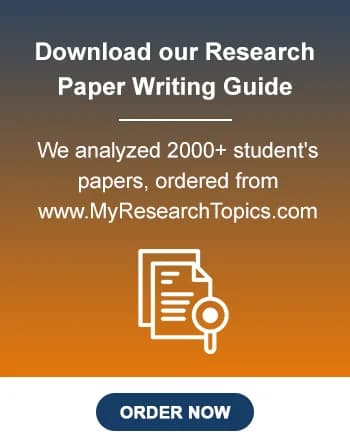
Other Related Guides
- Research Project Questions
- Types of Validity in Research – Explained With Examples
- Schizophrenia Sample Research Paper
- Quantitative Research Methods – Definitive Guide
- Research Paper On Homelessness For College Students
- How to Study for Biology Final Examination
- Textual Analysis in Research / Methods of Analyzing Text
A Guide to Start Research Process – Introduction, Procedure and Tips
Research findings – objectives , importance and techniques.
- Topic Sentences in Research Paper – Meaning, Parts, Importance, Procedure and Techniques
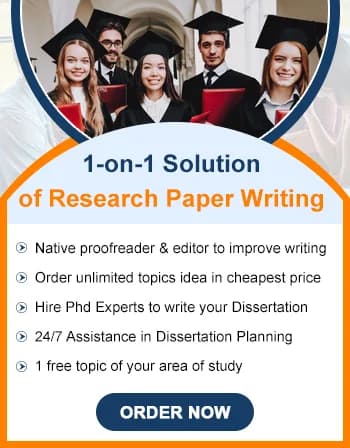
Recent Research Guides for 2023
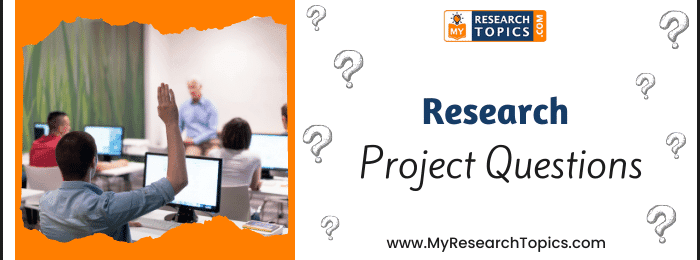
Get 15% off your first order with My Research Topics
Connect with a professional writer within minutes by placing your first order. No matter the subject, difficulty, academic level or document type, our writers have the skills to complete it.

My Research Topics is provides assistance since 2004 to Research Students Globally. We help PhD, Psyd, MD, Mphil, Undergrad, High school, College, Masters students to compete their research paper & Dissertations. Our Step by step mentorship helps students to understand the research paper making process.
Research Topics & Ideas
- Sociological Research Paper Topics & Ideas For Students 2023
- Nurses Research Paper Topics & Ideas 2023
- Nursing Capstone Project Research Topics & Ideas 2023
- Unique Research Paper Topics & Ideas For Students 2023
- Teaching Research Paper Topics & Ideas 2023
- Literary Research Paper Topics & Ideas 2023
- Nursing Ethics Research Topics & Ideas 2023
Research Guide
Disclaimer: The Reference papers provided by the Myresearchtopics.com serve as model and sample papers for students and are not to be submitted as it is. These papers are intended to be used for reference and research purposes only.
Custom Essay, Term Paper & Research paper writing services
- testimonials
Toll Free: +1 (888) 354-4744
Email: [email protected]
Writing custom essays & research papers since 2008
How to write a research paper hook.
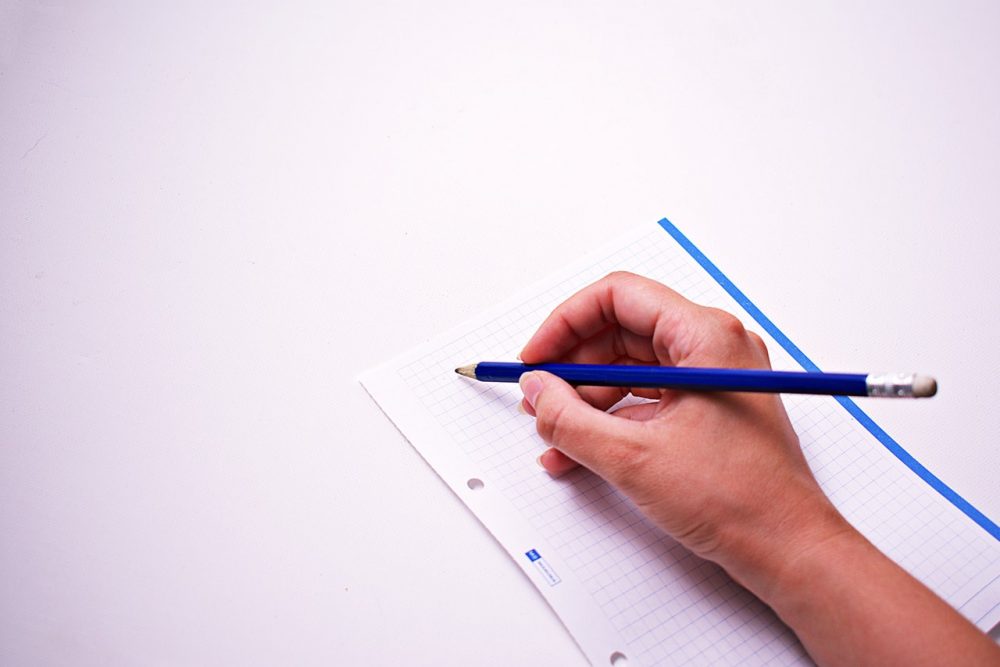
Do you know what is a hook in writing? You cannot understand how to write a hook for a research paper without defining what a hook is. This is a statement that attracts the attention of the reader to an essay. You have to make sure that you capture the attention of the person who will be reading your essay. You could be having very important information in your essay but poor introduction can make the reader to fail to get it.
You can capture the attention of your reader by having a catchy opening sentence in the paper. The challenge with most students is that they don’t know how to write a good hook for a research paper. You need to give this your best because it is the attention grabber. You have to make sure that you pull the reader from all the things that he is doing and make him or her concentrate on your paper.
Things to Consider Before Writing a Hook for Research Paper
You need to put a few things into consideration to write a good hook for your research paper. These include:
- Understand the Nature of Literacy you are Writing Well
There are several literacy works and each of them always has a unique approach. For instance there is a great distinction between descriptive and narrative essays with augmentative and critical essays because their writing strategies vary. Thus, you need a clear understanding of your work for you to know how to make a hook.
- Let Your Essay Have a Proper Outline
Preparing an excellent outline for your essay is critical because it will help you to note the core concepts you need to highlight and identify the structure.
- Understand Your Audience
Each essay is designed for a specific audience an every audience has a unique way of understanding things. Thus, you need a clear understanding of your audience so that as continue writing a hook, you will get to know their interests.
- Understand why you are writing the Essay
How to Write a Hook That Will Capture the Attention of Your Reader
After understanding what a hook in writing is, you should know how to write one that will capture the attention of your readers. To get everything right, you need to:
- Develop an Outline for Your Essay
The outline represents the skeleton of your paper which are the main points you will be highlighting. Think about the primary goals of your essay and what you would like to bring to light. It will give you a basic idea of what your paper will contain. What you highlight will help you to determine how to write a hook for a research paper.
- Identify Your Thesis Statement
The thesis basically represents what your paper is all about or the message you are sending to your reader. All the other things in your essay will work towards adding flesh to your thesis statement. First, highlight the primary idea of your writing based on the topic you are addressing. Thereafter, highlight several hook sentences and then choose one that best suits your needs.
- Use Your Thesis as the Basis for Writing Your Hook
The hook has to flow hand in hand with the primary ideas of your essay. Thus, part of your hook definition lies in your thesis statement. The position of your hook has to smoothly shift to your introduction section. Let the hook that you choose be relevant to both the thesis statement and the entire paper. For example, if you are dealing with a complex phenomenon, it will be meaningless to begin with a joke as your hook.
- Know Your Audience
The best sentence starters should capture the attention of your audience. Knowing your audience will help you to develop a hook that augers well with them. Evaluate your readers and think about the things that will draw their attachment to your paper so that they can follow through what you are writing. If you are writing to your peers, you may use a joke as a hook in your paper. On the other hand, you need to use some interesting facts if you are writing to your professor.
- Have the Right Transition to the Whole Essay
Most Popular
How to write a hook, how to do footnotes, how to write a 5 paragraph essay.
23 hours ago
How To Write An Opinion Essay
41 mins ago
How To Write a Synthesis Essay

When writing a good essay, you want to capture the reader’s attention from the very first sentence to keep them focused throughout the following text. The ‘hook’ of an essay is that opening sentence – the first impression that sets the tone for the rest of your writing. It’s the bait you use to catch your readers, urging them to continue going deeper into the text. And since it is kind of an art form, you need a certain knowledge to craft perfect hooks. In the guide below we will give all the necessary details on how to make a good hook, so you better don’t skip on reading this article the whole way through.
Hooks for Essays: What Are Those?
An essay hook is essentially the first one or two sentences of your essay. Sometimes though (if it is relevant to your writing) it can even take the space of the whole first paragraph. Its main purpose is to intrigue your audience and pique their interest, compelling them to continue reading. If you are wondering why you need a well-crafted hook here are just a few reasons off the top of our heads:
- To draw in the readers
- To seamlessly connect to the broader theme or argument of your essay. Depending on the type of essay you are writing, your hook can be in the form of a question, a surprising statistic or fact, an anecdote, a quote, or even a vivid description.
- To set the tone for the rest of your writing
See, you don’t write your text just for yourself – you are doing it for your audience, whoever that might be. That’s why you need to make your reader want to stick out till the end of the text, and do that from the very beginning.
Top Hook Sentence Starters: Types and Examples
If you ask different writers, some of them might say that a rhetorical question makes a good hook, or that adding a quote is a much better way to start your writing. The thing is, all of these statements are true. There are several ways to create good hooks for argumentative essays. Choosing the one for you will depend on the audience, your writing style, and the topic of your text.
You may have seen that a lot of texts (not just essays, for that matter) start with some kind of quote, either from a book, article, a famous person, or even the writer’s relative or friend. The reason behind this is that it is rather a simple way to intrigue the reader from the very beginning.
Quotes are compact and mostly widely recognizable, and they present the main idea of your text right away. To find a fitting quote, you can explore classic literature, speeches by influential figures, research articles, or even poetry. The key is to select a quote that aligns with the essay’s subject and contributes meaningfully to the argument or narrative being constructed.
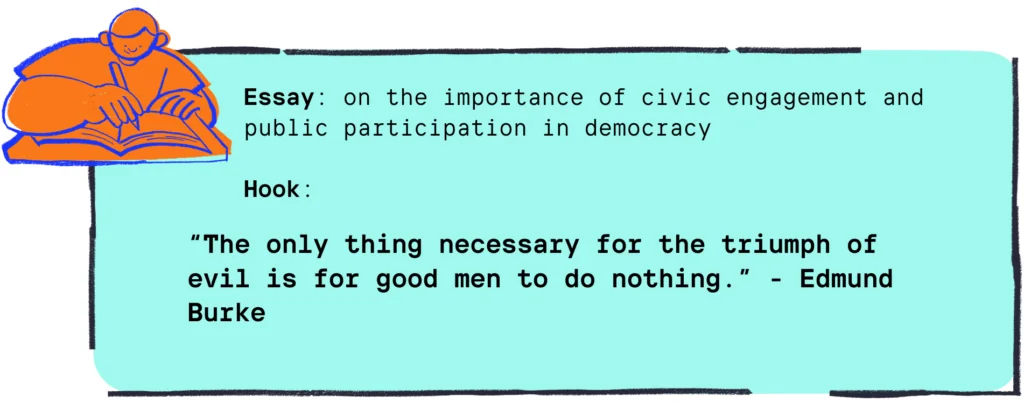
❓Rhetorical Question
A rhetorical question is a query that’s posed for its persuasive effect rather than a direct answer. By asking a question, you directly engage the reader, prompting them to consider their own stance or feelings regarding the topic at hand, thus creating a deeper personal connection between them and the text they read.
Essays that stand to benefit most from a rhetorical question as a hook are those that aim to explore moral dilemmas, provoke critical thinking, or challenge conventional beliefs. This type of hook is ideally suited for audiences who enjoy intellectual engagement and are prepared to contemplate complex issues. A well-built rhetorical question should be open-ended, avoiding simple yes or no answers, and should ideally lead seamlessly into the argument or thesis of your essay.
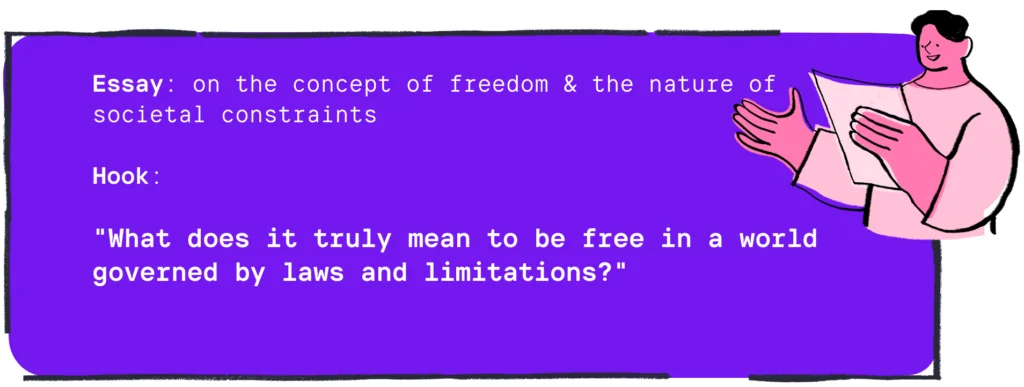
📊Statistic/Fact
Integrating a fact or statistic into your essay’s opening can instantly ground your reader in the reality of your topic. It offers them a tangible piece of evidence that vividly shows the importance of the issue you present. This type of hook is particularly effective in persuasive or argumentative essays where empirical evidence can support your stance right away. A compelling fact or statistic surprises (or shocks) the reader as well as provides a solid foundation for the arguments that follow. This makes it easier for your audience to appreciate the significance of your essay.
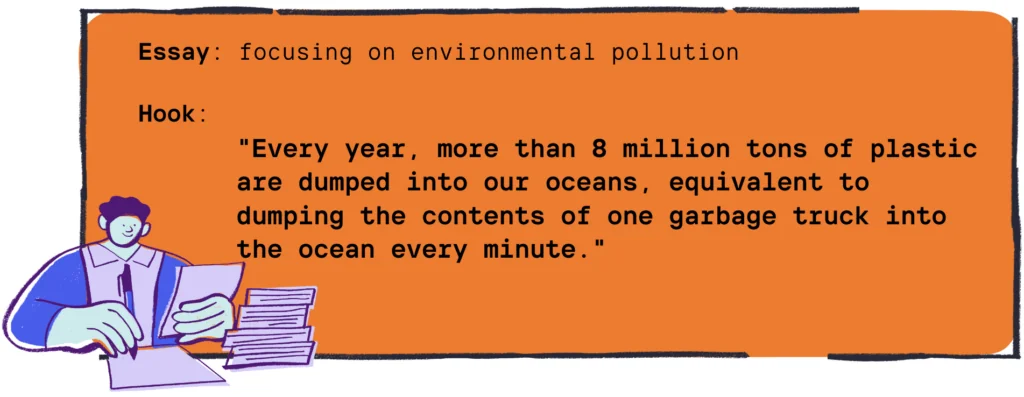
Anecdotes are brief, engaging stories showcasing a slice of life. This can help reveal the essay’s theme, making the topic relatable and memorable to the audience. An anecdote hook works exceptionally well in narrative and college application essays, or pieces designed to evoke an emotional response or deeper understanding of a universal human experience.
To make your anecdote work as a hook, you can use the STAR (Situation, Task, Action, Result) method. Using this approach, you structure your story by first setting the scene (Situation), then describing the purpose (Task), detailing what was done (Action), and, finally, revealing the outcome (Result).
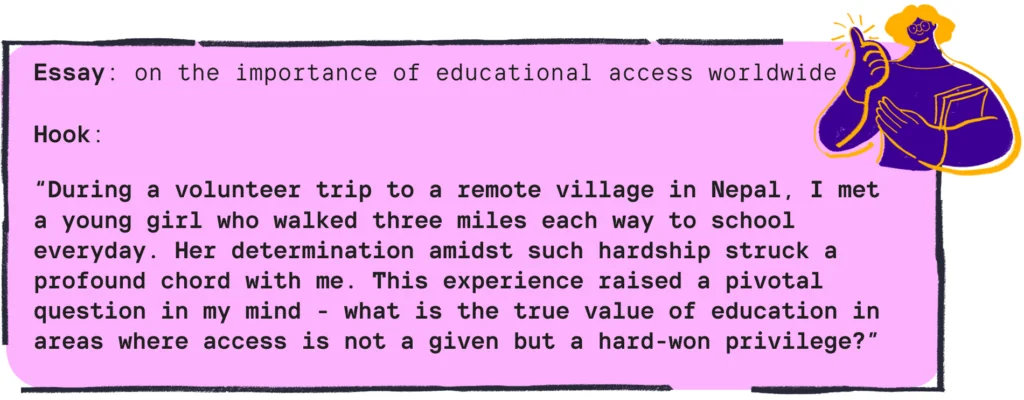
🧐Common misconception
Starting with a common misconception is a dynamic way of engaging with the audience. With such a hook you can challenge their beliefs and assumptions. Using a widely held but incorrect belief, you immediately create a narrative tension that compels the reader to continue, eager to uncover the truth. This method is particularly effective in essays that aim to debunk myths, promote critical thinking, or introduce lesser-known facts about popular topics.
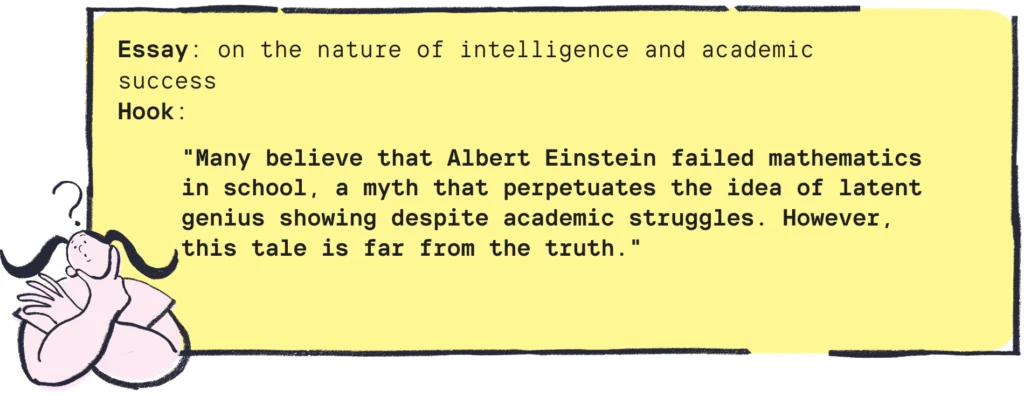
✍️Description
Descriptions are mostly used to transport the audience into the discussed scene or subject matter This technique involves painting a detailed picture with words and using sensory descriptions to evoke the sights, sounds, smells, tastes, and textures relevant to your essay’s topic. Description hooks are particularly effective in narrative essays, descriptive pieces, travel writing, and essays aiming to evoke a strong sense of place or atmosphere.
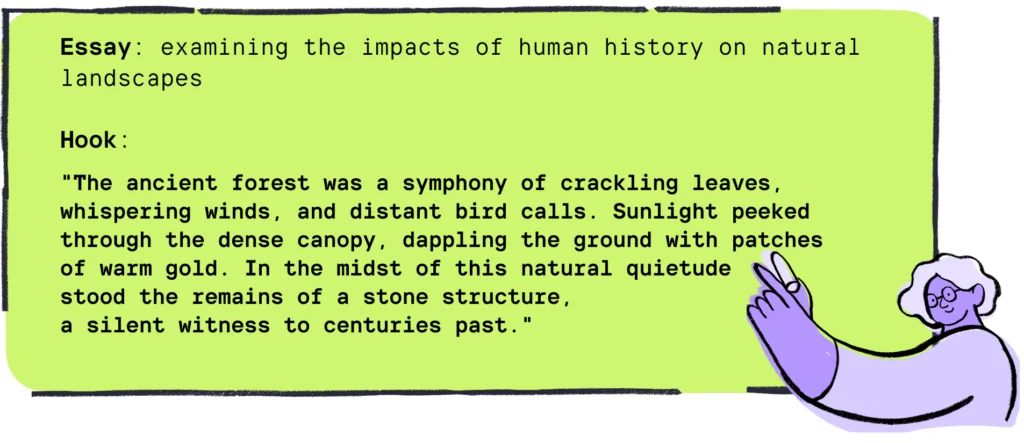
Jokes tend to lighten the mood especially if the topic lends itself to a humorous approach. Therefore, using it as your opening statement can spark joy or amusement in your readers, making them want to stay for a heartwarming story. This type of hook is mostly used to set a friendly and approachable tone for the piece. Note though, that your joke needs to balance humor with the serious intentions of the essay, providing an inviting entry point without undermining the piece’s overall message or purpose.
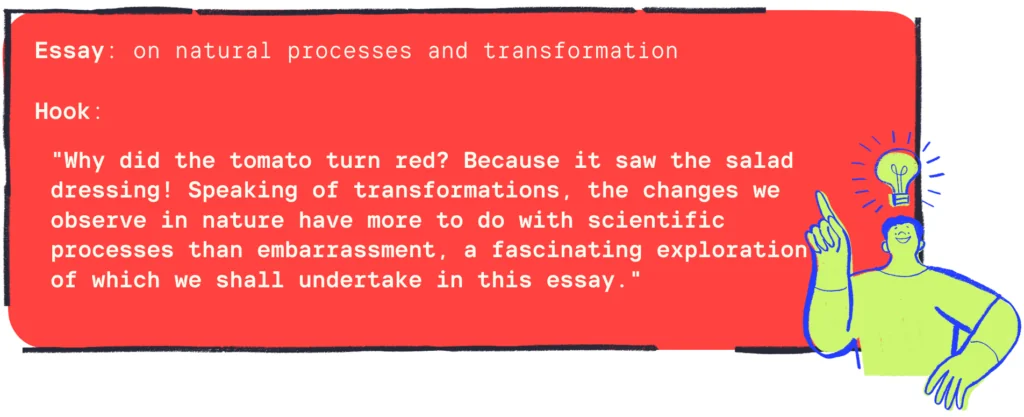
Key Steps & Tips on How to Write a Hook
Now, you know what a hook is and what types of opening sentences there can be. Overall, this knowledge is enough for you to understand how to start your essay in an attention-grabbing manner. However, we have a few notes on how you can build your writing process specifically to create a compelling hook:
- Understand Your Audience : Tailor your hook to the interests and expectations of your readers. Consider the style and level of formality that will work for your audience.
- Define the Tone of Your Essay : The overall tone of your essay is important, and the first sentence or two should also be written in the same style. Whether it’s serious, humorous, or somewhere in between, stick to the initial way of writing.
- Make it Relevant : Your first sentence needs to be relevant to your essay’s main theme or argument. After all, you don’t want to confuse your reader.
- Keep it Concise : As a hook is just an opening statement, it should be brief and impactful, setting the stage without overwhelming the audience.
- Experiment : Don’t be afraid to try different types of hooks to see what works best for your essay. After all, all texts are different.
We have also a few extra tips on how to make your first couple of sentences more authentic and gripping. For example, you can use sensory details to add depth and imagery to your words. It especially works for description hooks. Be careful with cliches and popular phrases though. Besides, don’t give away too much information in your hook – leave your readers wanting more. Have fun with it, play around with words, and maybe add puns. Writing a hook can be a creative and exciting process, so embrace it.
What Makes The Good Hooks for Essays
What fundamentally distinguishes a compelling hook from a bland one is its ability to instantly grasp the reader’s attention and seamlessly connect them to the core theme of the writing. In essence, a good hook is the one that is a) relevant and b) intriguing. And what should influence your choice of the right hook is the initial intent of the writing. Understand the purpose behind your work— to inform, persuade, entertain, or provoke thought— and you will certainly make the right choice for your first few sentences.
Sometimes though, even the most creative of writers can’t come up with a great starter on the spot. If this is your case, don’t fixate on the situation. Continue writing your essay and after it’s done come back to the introduction. This way you will already have an idea of how your essay looks like and the key points it discusses, so it will be much easier for you to pick an opening line for your writing.
It is also a good idea to reflect on the emotions or reactions you want to evoke in your readers. This will help you choose a quote or an anecdote that will adequately convey those exact feelings. And don’t tie yourself to the conventional ways of building hooks. You can always try and come up with something unique, that will fit best for your essay specifically. Experimentation, paired with a deep understanding of your intended audience and the core message of your piece, often leads to discovering that perfect starting point for your writing.
Creating a perfect hook is all about building an immediate, meaningful connection with your audience. The key lies in understanding who your readers are and what resonates with them, then carefully selecting and writing down an opening that aligns with the overall tone and theme of your essay. It doesn’t really matter whether you use a poignant quote, a compelling question, or an intriguing statistic. The right hook can transform the ordinary into the extraordinary, turning passive readers into active participants in the narrative you’re building.
What is a good hook sentence?
A good hook sentence grabs the reader’s attention, making them eager to continue reading. It can be a question, a quote, a startling fact, or any statement that provokes curiosity or emotion.
How do you write an effective hook?
To be able to write an effective hook, you need to know your audience, choose a hook that matches the tone of your essay, make it relevant to your topic, and make it concise and impactful. Don’t be afraid to experiment with different types of essay starters until you find the one that works best for your text.
What is a catchy hook for an essay?
A catchy hook is one that is memorable and engaging, often through humor, a shocking fact, or a thought-provoking question. So, be creative and think outside the box when crafting the first sentences of your essay. They will set the tone for your further writing.
How do you grab readers attention in an introduction?
The main trick to grabbing readers’ attention in an introduction is using a relevant hook sentence, that will be intriguing, and tailored to the audience’s interests or emotions. It should also connect to the main theme or argument of your essay. So, make sure you put effort into building a strong and effective starter for your essay. Because those first few sentences will determine whether your writing will be set out for success or not.
Follow us on Reddit for more insights and updates.
Comments (0)
Welcome to A*Help comments!
We’re all about debate and discussion at A*Help.
We value the diverse opinions of users, so you may find points of view that you don’t agree with. And that’s cool. However, there are certain things we’re not OK with: attempts to manipulate our data in any way, for example, or the posting of discriminative, offensive, hateful, or disparaging material.
Cancel reply
Your email address will not be published. Required fields are marked *
Save my name, email, and website in this browser for the next time I comment.
More from How to Write an Academic Assignment
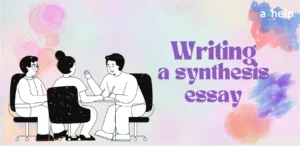
Remember Me
What is your profession ? Student Teacher Writer Other
Forgotten Password?
Username or Email
Hook Examples Generator
- 🎣 Do I Need a Hook?
- 💡 Examples of Hooks
🔗 References
🎣 do i need a hook for essays.
Students often spend a lot of time procrastinating on their work because they need help figuring out where to start. Writing an introduction to any paper is a challenge. That's why here, we bring to your attention our hook examples generator. This straightforward and easy-to-use tool not only will not only support you in getting started on your project, but will also make it even more engaging for your audience.
So, what is a hook? And what is it for? Let's find out together!
What Is a Hook?
A hook appears in the text as an opening sentence or paragraph that forms first impression and encourages readers to continue reading.
The hook aims to set the essay's tone and style, allowing you to stand out, but this part differs from the introduction.
So, after you have intrigued the reader, you can introduce the topic by giving background information and a thesis statement.
As for the size, the hook can range from 1 sentence to an entire 6-sentence paragraph . It all depends on the expected length of your paper, the hook type, and your preferences. When you choose the hook type, consider the audience and the purpose. However, you shouldn’t overload it with unnecessary details. It may have good content and lots of information, but it won't be as appealing and memorable as you could imagine.
How to Write a Good Hook
Whether you're writing a philosophy essay , a descriptive essay , or an essay about your personal story , you will find help in our advice. In the following section, we'll tell you what to pay attention to. We'll also give you some tips to make your hook writing process easier and point you in the right direction.
💡 Examples of Hooks in Writing
The truth is, almost anything can be a hook. A well-constructed statement, an interesting fact, or an appropriate quote can make excellent openings for your introduction. Nevertheless, some of them will be more effective than others, depending on the kind of work you do. Here, we'll tell you about different examples of hooks in writing.
Argumentative Essay Hooks
As this essay type aims to research, present, and explain evidence, two hooks will work for you — fact and common misconception . If you choose to go with the factual approach, you should find something captivating. We can't use a fact that we've heard many times before. If you can’t find a piece of impressive information, then use a common misconception. This will intrigue your audience and motivate them to read on to find the truth.
Bacteria are tiny but scary-looking organisms that can make one frightened even on a photograph. However, not all of them are harmful. While some bacteria spread disease, others help our bodies absorb nutrients and digest food.
Informative Essay Hooks
As a rule, an informative essay aims to educate your readers or advance in-depth on a topic. A hook with statistical data will work fine in this case. The main thing is to cite the source to avoid sounding baseless. It’d also be interesting to start with a question to stimulate reasoning from the audience. There is a good chance that a provocative question will motivate reading.
What would you do if a tarantula bit your friend?
Expository Essay Hooks
An expository essay is a revealing text with factual information for comparisons and contrasts. Consequently, it'd be ideal to use conflict as a hook. For example, you could give several opinions on the topic.
On the one hand, genetic engineering helps us to fight diseases and gene defects, but on the other hand, people find it unethical and unnatural.
Another option is to use a definition as a hook, which can be straightforward yet effective.
Success is often used to describe achieving a desired outcome. However, success means different things to different people.
Literary Analysis Hooks
A literary analysis aims to examine or evaluate a work of literature carefully. Therefore, a quotation hook is excellent because you can take a famous or relevant quote to make an essay memorable and thought-provoking.
“So we beat on, boats against the current, borne back ceaselessly into the past” - this is how Fitzgerald’s The Great Gatsby ends.
The same powerful impact on reflection has a hook phrased as a metaphor . The reader may need time to understand what the paper is about or interpret it differently.
Presentation Hooks
You can present your material in many ways, depending on the topic and the tone you want to set. You can start with an exciting question for intrigue or use a striking fact . It's equally effective to give statistics , if those are relevant to your presentation. But one unusual choice would be a strong statement hook. We use it to provide an affirmative stance about a certain topic that leaves no room for discussion. In turn, your audience will definitely be intrigued to see how you can back up your position.
Vegetarianism is an example of a healthy and balanced nutrition.
Personal Statement Hooks
A personal statement is used by university applicants or job candidates . Therefore, the primary purpose of such an essay is to stand out among competitors. So, a great option is to start with an anecdote , immediately setting the readers into a positive mindset. Then, you increase your chances of being remembered with good associations. Alternatively, you can start with a story or a relevant. But remember that this is an academic type of writing, and you need to know the measure and stay formal.
The most memorable experience during my undergraduate studies was...
Also, we recommend the descriptive hook, which is brilliant for a personal narrative. You can write about a successful project you’re planning or have done.
Did our hook examples generator help you in your work? If you want to know more about it, read our FAQ section below!
❓ Hook Examples Generator – FAQ
Updated: Oct 25th, 2023
- How to Write a Hook – East Stroudsburg University
- Hooks and Grabbers – Las Positas College
- How to Write a Hook: Essay Writing~Introduction – The Learning Depot
- Hooks and Attention Grabbers - Tutoring and Learning Centre, George Brown College
- Different Types of Hooks for Essays with Examples – HighArts.org
- Free Essays
- Writing Tools
- Lit. Guides
- Donate a Paper
- Referencing Guides
- Free Textbooks
- Tongue Twisters
- Job Openings
- Expert Application
- Video Contest
- Writing Scholarship
- Discount Codes
- IvyPanda Shop
- Terms and Conditions
- Privacy Policy
- Cookies Policy
- Copyright Principles
- DMCA Request
- Service Notice
Take the time to familiarize yourself with our hook examples generator. This free online tool will save you plenty of time and energy thinking about how to begin writing your academic paper. Don’t know which hook will be most applicable? Not a problem! Learn all about examples of hooks in writing from this page.
Hook Examples (For Essays, Stories, Articles, and More)

What are good hook examples to get my creative writing inspiration flowing? Many elements go into an effectively written piece of work. Using these elements to your advantage will help you write better essays, assignments, articles, stories, and more. The hook is one of these elements. It is what “hooks” the reader onto your work. The skill to write a compelling hook will decide whether people want to read your writing or not.
Learn about hooks and see examples in this comprehensive guide…
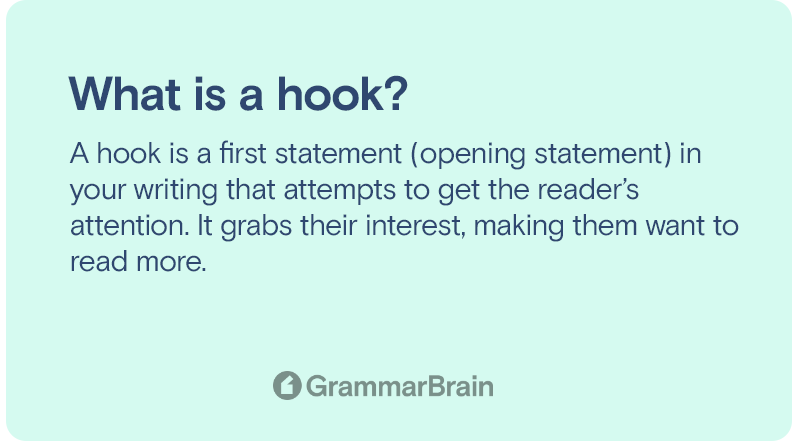
What Is Hook?
A hook is a first statement (opening statement) in your writing that attempts to get the reader’s attention. It grabs their interest, making them want to read more.
In essence, make your hook catchy . Readers should be motivated to continue reading the whole piece.
To achieve this, read your material multiple times and understand the central theme. The hook must follow that theme. It cannot be random for the sake of being catchy.
For making your hooks catchy, there are multiple things at your disposal. Use humor, state relevant and shocking facts, ask rhetorical questions or borrow a famous quote to develop good hooks.
Hook Examples
As mentioned earlier, there are multiple types of hooks . Choose the type that best suits the written material based on the nature of your essay or article.
In a nutshell, hooks come in 5 varieties – Sentences, Questions, Story Openings, Facts or Statistics, and Quotations.
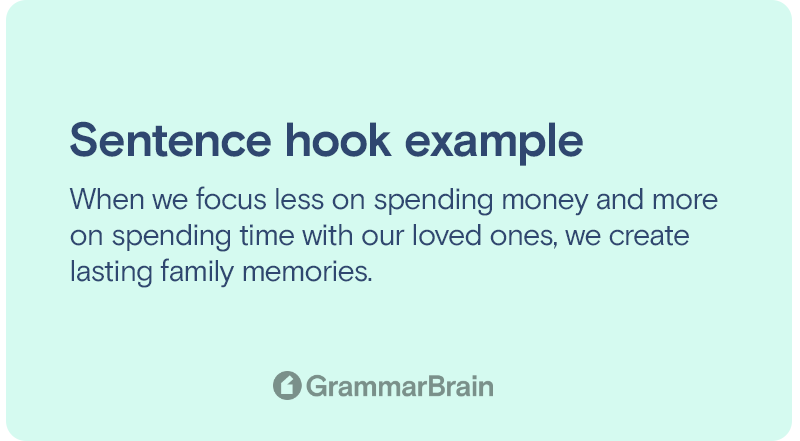
Sentence Hook Examples
Start your article with a convincing opening statement or sentence. The first sentence will act as your hook if it is sensational or catchy enough. When you make a strong statement, you create a powerful impression on the reader.
Whether the reader agrees or disagrees with you is not the question. If they find your statement compelling, the readers will be intrigued to learn more about what you have to say. It will make them read your article or essay.
Here are some excellent sentence hook examples:
- When we focus less on spending money and more on spending time with our loved ones, we create lasting family memories.
- Modern families can achieve food security by growing a vegetable garden in these unpredictable times.
- When you bring a pet home, you also positively impact your safety, happiness, and health.
- A gig economy can be brutal unless you are willing to master the art of living to work rather than working to live.
- Traveling to other places, meeting new people, and experiencing new cultures inspire people to view the world from a new perspective.
- For the people of Washington, DC, paying federal income tax despite the lack of federal government representation is a sad reality.
- Wildfires engulf the forests of California each year, burning down many houses and leaving burnt patches of once-fertile land in their wake.
- A foster child’s complaint is not about going to school every day but having to change their homes and family frequently.
- The United States of America has topped another list. But it is no cause for celebration as an average American consumes 25 teaspoons of sugar daily, making the US a world leader in added sugar consumption per capita.
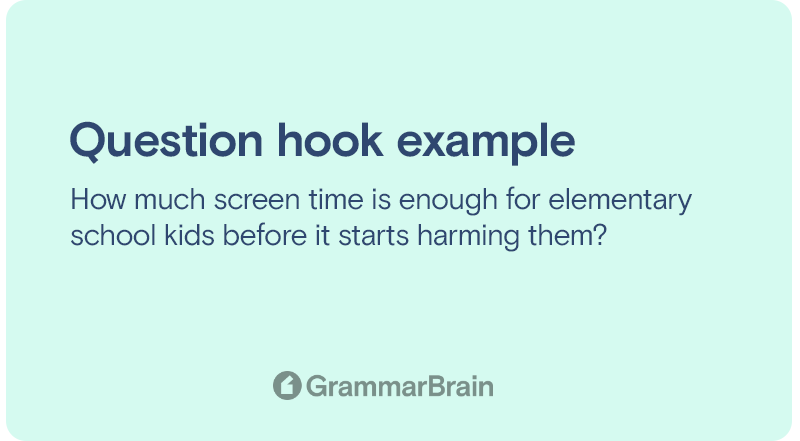
Question Hook Examples
If you do not wish to assert yourself, ask the readers a question instead. People instinctively feel the need to respond when posed with a question, even if it is through writing.
But how do you hook the readers through a question? The trick lies in balancing the overall message of your work with a relatable but thought-provoking question.
Pose a question that is connected to your written material and triggers a reader’s curiosity. Ask a shocking, probing, or universal question whose answer a reader wants.
Here are some question hook examples for your reference:
- How much screen time is enough for elementary school kids before it starts harming them?
- How important are SEO (Search Engine Optimization) strategies for budding and existing YouTubers?
- Will the presidential election see a record-breaking voter turnout this year?
- If commercial or RTE (Ready To Eat ) food goes out of stock for a prolonged period , will your family manage to eat well?
- Are online classes a comparable alternative to attending school?
- Do degree-based jobs offer more potential to earn than skill-based trades?
- Do you know the likelihood of women suffering from depression is twice that of men?
- How much junk food do you eat in a day?
- Are your poor sleeping habits preventing you from feeling fresh in the morning?
- Would you be able to perform your daily activities if you suffered from never-ending chronic joint pain?
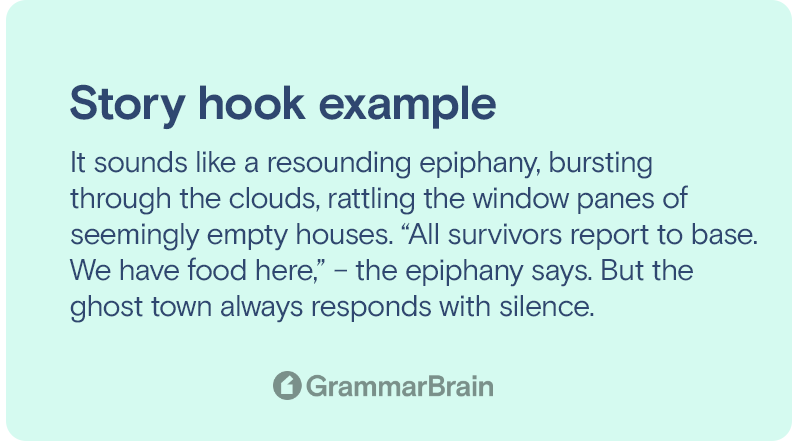
Story Hook Examples
A hook is as important in fiction as it is in non-fiction writing. Without a good opening, your story will begin with a rocky start. In the worst-case scenario, readers may not even finish the first paragraph before picking up another story (with a much better hook, presumably).
In short, a story hook creates questions, triggers curiosity, and promises a satisfying read.
Here are some story hook examples :
- It sounds like a resounding epiphany, bursting through the clouds, rattling the window panes of seemingly empty houses. “All survivors report to base. We have food here,” – the epiphany says. But the ghost town always responds with silence.
- This is not how she had imagined her date. It was Valentine’s , the festival of red. But she’d rather wear that color than wash it off her hands after examining the murdered victim with her forensics team.
- Around 50 people had gathered around Tom. Some of them were shouting, some were shrieking. It was all gibberish to Tom’s ears, who stood far atop the derelict bridge, looking down at the cliff under his feet.
- I like to play with my food. Today they gave me peas with mashed potato. The potato still had lumps, so I made small potato balls and arranged them with the peas. When the master likes my work, he gives me two meals daily.
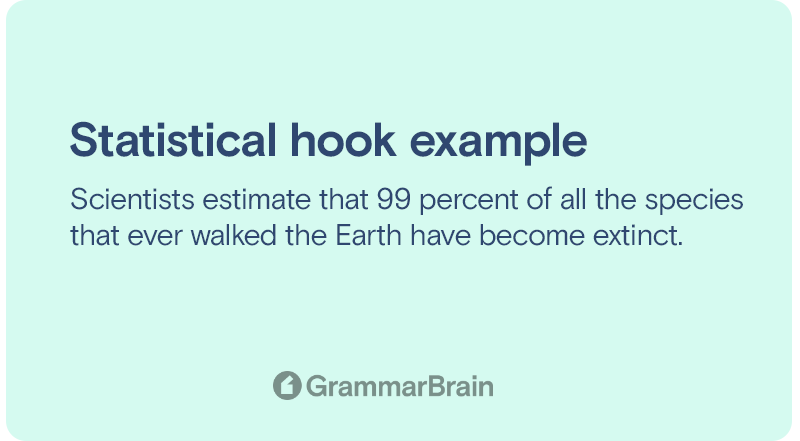
Statistical or Factual Hook Examples
Honesty is often the best policy. Statistical or factual hooks represent this notion.
Instead of writing something clever, witty, shocking, or sentimental, hit your readers with essential facts from the get-go.
Interesting insights and facts relevant to the article can make a reader interested in gaining more knowledge. This method is particularly useful for essays, reports, and articles. But even stories can begin with a fact, depending on how to paraphrase it.
Here are some statistical hook examples :
- Scientists estimate that 99 percent of all the species that ever walked the Earth have become extinct.
- 43 to 54 percent of pilots confess they have fallen asleep while flying. A third of them reported waking up next to a sleeping co-pilot.
- Posts on Twitter will likely get 35 percent more retweets if they include a picture.
- Roughly 80 percent of the males born in the Soviet Union in 1923 died in the Second World War.
- Around 28 percent of the IT sector employees never tell their friends and family about it for fear of being requested to fix their computers.
Quotation Hook Examples
Lastly, using someone else’s quote is an exciting way to write a hook. The quote need not be famous. However, when you look for a quote, ensure it is interesting and related to your written material.
Pick the quote you like. The quote can be from an article, movie, speech, interview, etc.
Assertion Sources – Cite Them Properly
When it comes to statistical/factual hooks and quotation hooks, pay special attention to the following:
- Always state the information or quote accurately. Reconfirm and revise it to avoid grammatical or typographical errors.
- After stating the information or quote, cite the sources if it is a quotation, and mention who said it and where they said it. If it is a statistic, mention the original source (research paper, article, etc.).
No, the hook must appear in the beginning . Otherwise, it will not manage to grip the reader.
There are 5 types of hooks – statements, questions, statistical, quotation and story.
Definitely! Your title should be as catchy as the first statement of your written material.
Inside this article
Fact checked: Content is rigorously reviewed by a team of qualified and experienced fact checkers. Fact checkers review articles for factual accuracy, relevance, and timeliness. Learn more.

About the author
Dalia Y.: Dalia is an English Major and linguistics expert with an additional degree in Psychology. Dalia has featured articles on Forbes, Inc, Fast Company, Grammarly, and many more. She covers English, ESL, and all things grammar on GrammarBrain.
Core lessons
- Abstract Noun
- Accusative Case
- Active Sentence
- Alliteration
- Adjective Clause
- Adjective Phrase
- Adverbial Clause
- Appositive Phrase
- Body Paragraph
- Compound Adjective
- Complex Sentence
- Compound Words
- Compound Predicate
- Common Noun
- Comparative Adjective
- Comparative and Superlative
- Compound Noun
- Compound Subject
- Compound Sentence
- Copular Verb
- Collective Noun
- Colloquialism
- Conciseness
- Conditional
- Concrete Noun
- Conjunction
- Conjugation
- Conditional Sentence
- Comma Splice
- Correlative Conjunction
- Coordinating Conjunction
- Coordinate Adjective
- Cumulative Adjective
- Dative Case
- Declarative Statement
- Direct Object Pronoun
- Direct Object
- Dangling Modifier
- Demonstrative Pronoun
- Demonstrative Adjective
- Direct Characterization
- Definite Article
- Doublespeak
- Equivocation Fallacy
- Future Perfect Progressive
- Future Simple
- Future Perfect Continuous
- Future Perfect
- First Conditional
- Gerund Phrase
- Genitive Case
- Helping Verb
- Irregular Adjective
- Irregular Verb
- Imperative Sentence
- Indefinite Article
- Intransitive Verb
- Introductory Phrase
- Indefinite Pronoun
- Indirect Characterization
- Interrogative Sentence
- Intensive Pronoun
- Inanimate Object
- Indefinite Tense
- Infinitive Phrase
- Interjection
- Intensifier
- Indicative Mood
- Juxtaposition
- Linking Verb
- Misplaced Modifier
- Nominative Case
- Noun Adjective
- Object Pronoun
- Object Complement
- Order of Adjectives
- Parallelism
- Prepositional Phrase
- Past Simple Tense
- Past Continuous Tense
- Past Perfect Tense
- Past Progressive Tense
- Present Simple Tense
- Present Perfect Tense
- Personal Pronoun
- Personification
- Persuasive Writing
- Parallel Structure
- Phrasal Verb
- Predicate Adjective
- Predicate Nominative
- Phonetic Language
- Plural Noun
- Punctuation
- Punctuation Marks
- Preposition
- Preposition of Place
- Parts of Speech
- Possessive Adjective
- Possessive Determiner
- Possessive Case
- Possessive Noun
- Proper Adjective
- Proper Noun
- Present Participle
- Quotation Marks
- Relative Pronoun
- Reflexive Pronoun
- Reciprocal Pronoun
- Subordinating Conjunction
- Simple Future Tense
- Stative Verb
- Subjunctive
- Subject Complement
- Subject of a Sentence
- Sentence Variety
- Second Conditional
- Superlative Adjective
- Slash Symbol
- Topic Sentence
- Types of Nouns
- Types of Sentences
- Uncountable Noun
- Vowels and Consonants
Popular lessons

Stay awhile. Your weekly dose of grammar and English fun.

The world's best online resource for learning English. Understand words, phrases, slang terms, and all other variations of the English language.
- Abbreviations
- Editorial Policy

Introduction
Ai generator.

The first paragraph of an essay or research paper is traditionally designated as the introduction, and its purpose is to introduce the subject matter and set the stage for the remainder of the documentary research . Because it’s responsible for both the reader’s first impression and set the stage for the rest of the work, the introduction paragraph , without prejudice to the conclusion paragraph , is arguably the most important paragraph writing in the work.
Writing a strong introductory paragraph is a valuable skill for students and academics to have. Here, we go over all you need to know to create the finest introduction, including what to include and a step-by-step procedure, as well as some samples of introductory paragraphs.
1. Sample Introductions Template
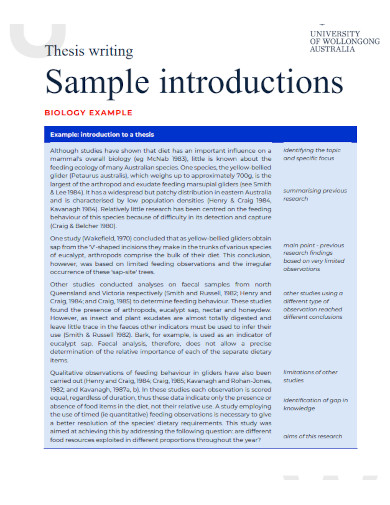
Size: 76 KB
2. Self Introduction Speech Examples
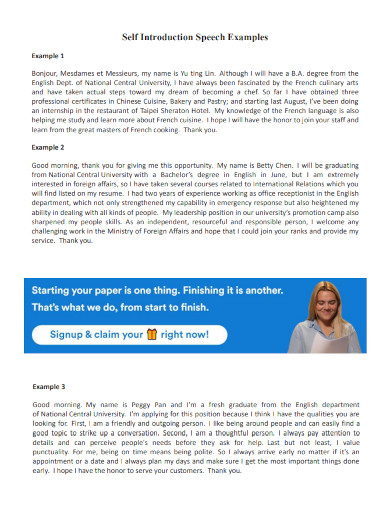
Size: 83 KB
3. Writing an Introduction Template
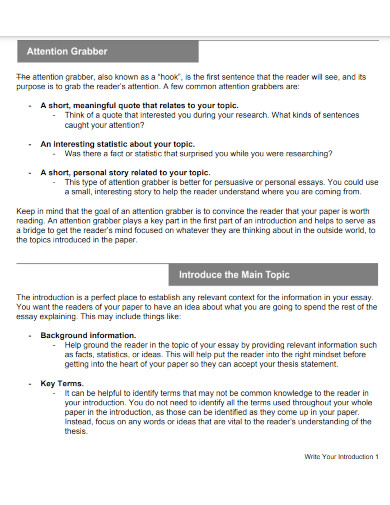
Size: 80 KB
4. Giving an Introduction Speech
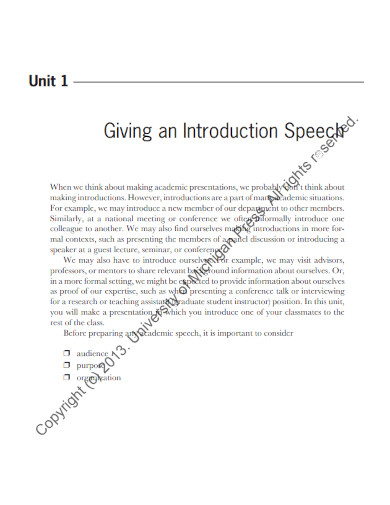
Size: 46 KB
5. Writing an Effective Introduction
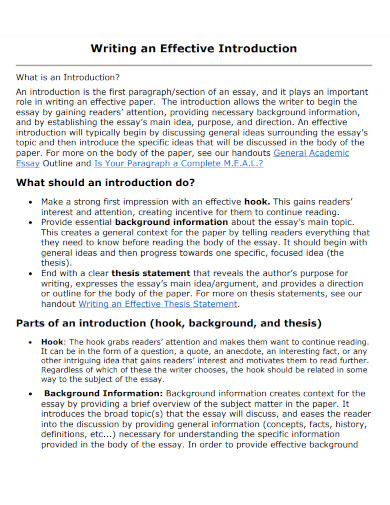
Size: 106 KB
6. Survey Introduction Example
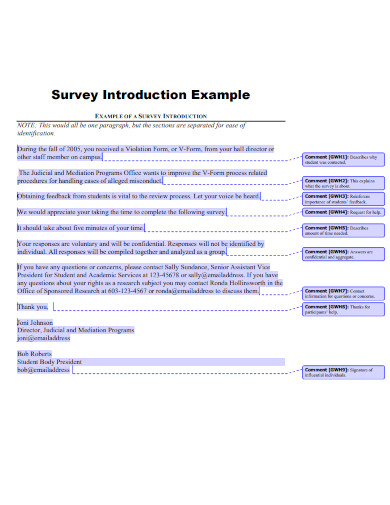
Size: 55 KB
7. Personal Introduction Guidelines
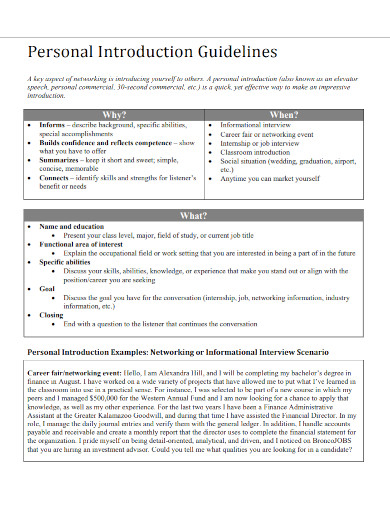
File Format
Size: 82 KB
8. Thesis Statements and Introductions
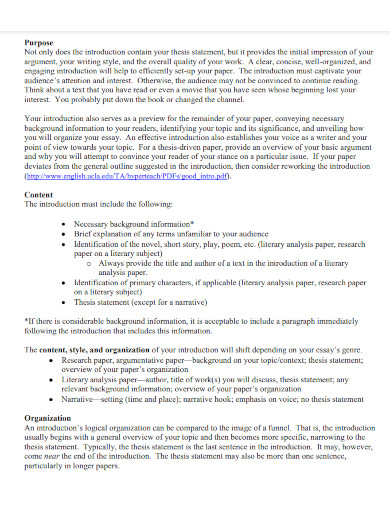
Size: 95 KB
9. An Introduction To Error Propagation
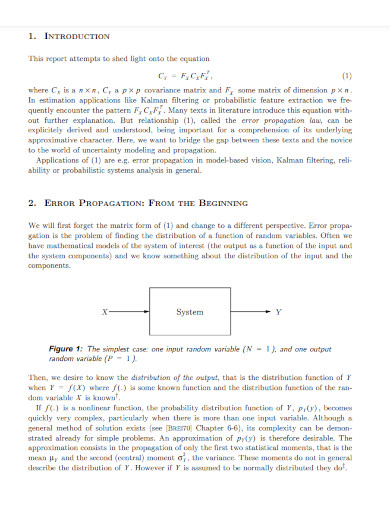
Size: 72 KB
10. Introduction to Hypothesis Testing
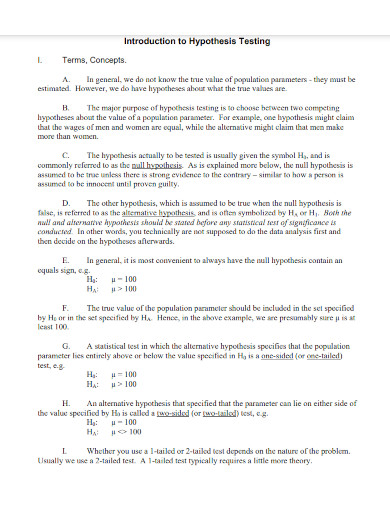
Size: 70 KB
11. Introduction Types of Wastes
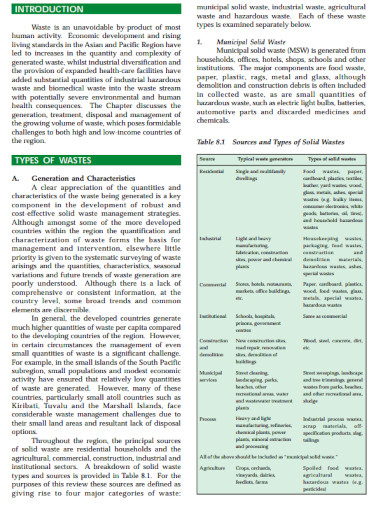
Size: 119 KB
What is an Introduction?
Essentially, the introduction serves to prime the reader for the rest of your work. A piece’s opening paragraph establishes the tone, voice, and writing style the reader may anticipate from the rest of the piece. The reader won’t be able to grasp your paper’s aim and main points unless they have the context provided by your introduction.
How to make a good Introduction?
An author’s tone and the requirements of the assignment (for instance, an essay can benefit from an amusing start, while a research paper would be better off with a more formal tone) determine how the document’s introduction is structured. It doesn’t matter what sort of paper you’re writing or what kind of writer you are; a solid introduction always has a hook, some background for context, and a thesis statement or primary argument.
Step 1: Establish the level of seriousness and style you’d want to use throughout your work.
Usually, the subject matter will dictate the tone: Writing an introduction for a report follows a different set of rules than writing an opening for an English essay. Even within essays of the same genre, there are linguistic boundaries; slang, for instance, might work in a reflective piece but not in an academically serious arguing one.
Step 2: Write your thesis statement.
Despite their brevity, thesis statements are often the single most crucial phrase in any given piece of writing. If your thesis statement is well-stated, your readers may utilize it as a point of reference for the essay as they read further.
Step 3: Think about what your reader needs to know about the context.
Provide some background on the discussion itself, even if your issue is an instance of abstractionism like an ethical dispute. How long has the ethical discussion been going on? Was there a particular occurrence that sparked it? In order to prevent your reader from feeling as if they are missing anything, information like this might assist create the scene.
Step 4: Think of a good hook.
The most challenging aspect of writing an introduction is likely to be coming up with a catchy hook. Although the body of your paper may consist mostly of providing facts, the introduction’s hook often demands you to spin a yarn out of thin air.
Step 5: Don’t feel rushed when you write a rough draft of your introduction.
If you become nervous just thinking about writing your introduction, don’t worry. As the introduction is traditionally the first section written, that’s where you start.
Step 6: Revise your introduction after you’ve written your whole paper.
After writing the first draft of your paper, you may find that you need to make some adjustments to the overall structure; if this is the case, be sure to update the introduction to reflect these changes. Editing for things like spelling and punctuation errors becomes much simpler when the first draft is complete.
How do I start my introduction?
The best introductions include all three of these elements: a hook to get the reader interested, some context for the issue so they can follow along, and a thesis statement that succinctly and clearly conveys your major argument.
What is a good introduction?
It is common practice for an essay’s opening to provide background information about the issue at hand, before moving on to outline the more narrowly focused arguments that will be developed in the essay’s body.
What is a good opening sentence for an essay?
You should just provide a brief overview of your subject and explain its significance. Optionally, you may additionally offer some of the essay’s supporting arguments or examples. No need to go into great detail here; this is only an introduction to your issue, not a thesis statement.
In conclusion , it takes time and effort to learn how to write an excellent introduction. It’s possible that you’ll have to rewrite them multiple times before you’re happy with the final product. Keep in mind that if you can hold on to just a few more readers, the effort will have been well worth it. You may also check out our free article on examples of essay writing and How to Write a Conclusion for an Essay .
Text prompt
- Instructive
- Professional
10 Examples of Public speaking
20 Examples of Gas lighting
share this!
May 13, 2024
This article has been reviewed according to Science X's editorial process and policies . Editors have highlighted the following attributes while ensuring the content's credibility:
fact-checked
trusted source
written by researcher(s)
AI-assisted writing is quietly booming in academic journals—here's why that's OK
by Julian Koplin, The Conversation

If you search Google Scholar for the phrase " as an AI language model ," you'll find plenty of AI research literature and also some rather suspicious results. For example, one paper on agricultural technology says,
"As an AI language model, I don't have direct access to current research articles or studies. However, I can provide you with an overview of some recent trends and advancements …"
Obvious gaffes like this aren't the only signs that researchers are increasingly turning to generative AI tools when writing up their research. A recent study examined the frequency of certain words in academic writing (such as "commendable," "meticulously" and "intricate"), and found they became far more common after the launch of ChatGPT—so much so that 1% of all journal articles published in 2023 may have contained AI-generated text.
(Why do AI models overuse these words? There is speculation it's because they are more common in English as spoken in Nigeria, where key elements of model training often occur.)
The aforementioned study also looks at preliminary data from 2024, which indicates that AI writing assistance is only becoming more common. Is this a crisis for modern scholarship, or a boon for academic productivity?
Who should take credit for AI writing?
Many people are worried by the use of AI in academic papers. Indeed, the practice has been described as " contaminating " scholarly literature.
Some argue that using AI output amounts to plagiarism. If your ideas are copy-pasted from ChatGPT, it is questionable whether you really deserve credit for them.
But there are important differences between "plagiarizing" text authored by humans and text authored by AI. Those who plagiarize humans' work receive credit for ideas that ought to have gone to the original author.
By contrast, it is debatable whether AI systems like ChatGPT can have ideas, let alone deserve credit for them. An AI tool is more like your phone's autocomplete function than a human researcher.
The question of bias
Another worry is that AI outputs might be biased in ways that could seep into the scholarly record. Infamously, older language models tended to portray people who are female, black and/or gay in distinctly unflattering ways, compared with people who are male, white and/or straight.
This kind of bias is less pronounced in the current version of ChatGPT.
However, other studies have found a different kind of bias in ChatGPT and other large language models : a tendency to reflect a left-liberal political ideology.
Any such bias could subtly distort scholarly writing produced using these tools.
The hallucination problem
The most serious worry relates to a well-known limitation of generative AI systems: that they often make serious mistakes.
For example, when I asked ChatGPT-4 to generate an ASCII image of a mushroom, it provided me with the following output.
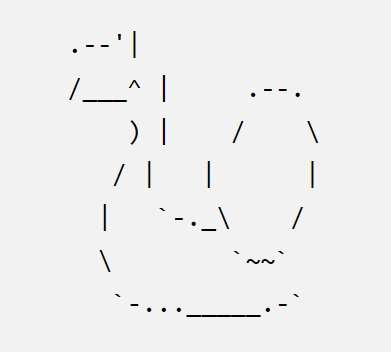
It then confidently told me I could use this image of a "mushroom" for my own purposes.
These kinds of overconfident mistakes have been referred to as "AI hallucinations" and " AI bullshit ." While it is easy to spot that the above ASCII image looks nothing like a mushroom (and quite a bit like a snail), it may be much harder to identify any mistakes ChatGPT makes when surveying scientific literature or describing the state of a philosophical debate.
Unlike (most) humans, AI systems are fundamentally unconcerned with the truth of what they say. If used carelessly, their hallucinations could corrupt the scholarly record.
Should AI-produced text be banned?
One response to the rise of text generators has been to ban them outright. For example, Science—one of the world's most influential academic journals—disallows any use of AI-generated text .
I see two problems with this approach.
The first problem is a practical one: current tools for detecting AI-generated text are highly unreliable. This includes the detector created by ChatGPT's own developers, which was taken offline after it was found to have only a 26% accuracy rate (and a 9% false positive rate ). Humans also make mistakes when assessing whether something was written by AI.
It is also possible to circumvent AI text detectors. Online communities are actively exploring how to prompt ChatGPT in ways that allow the user to evade detection. Human users can also superficially rewrite AI outputs, effectively scrubbing away the traces of AI (like its overuse of the words "commendable," "meticulously" and "intricate").
The second problem is that banning generative AI outright prevents us from realizing these technologies' benefits. Used well, generative AI can boost academic productivity by streamlining the writing process. In this way, it could help further human knowledge. Ideally, we should try to reap these benefits while avoiding the problems.
The problem is poor quality control, not AI
The most serious problem with AI is the risk of introducing unnoticed errors, leading to sloppy scholarship. Instead of banning AI, we should try to ensure that mistaken, implausible or biased claims cannot make it onto the academic record.
After all, humans can also produce writing with serious errors, and mechanisms such as peer review often fail to prevent its publication.
We need to get better at ensuring academic papers are free from serious mistakes, regardless of whether these mistakes are caused by careless use of AI or sloppy human scholarship. Not only is this more achievable than policing AI usage, it will improve the standards of academic research as a whole.
This would be (as ChatGPT might say) a commendable and meticulously intricate solution.
Provided by The Conversation
Explore further
Feedback to editors

Pottery residue research explores culinary traditions in Germany from the Early Neolithic to the Bronze Age
2 minutes ago

New research shows the true cost of reproduction across the animal kingdom
22 minutes ago

Bacterial proteins shed light on antiviral immunity
36 minutes ago

The observation of a Spin Berry curvature-enhanced orbital Zeeman effect in a kagome metal
39 minutes ago

Spiny legged 308-million-year-old arachnid discovered in the Mazon Creek locality
47 minutes ago

Data from MAXI J1820+070 shows Einstein was right about how matter plunges into a black hole
48 minutes ago

A devastating fire 2,200 years ago preserved a moment of life and war in Iron Age Spain, down to a single gold earring
10 hours ago

Airborne technology brings new hope to map shallow aquifers in Earth's most arid deserts
17 hours ago

First-generation medical students face unique challenges and need more targeted support, say researchers

Thermoelectric materials approach boosts band convergence to avoid time-consuming trial-and-error approach
Relevant physicsforums posts, physics education is 60 years out of date.
15 hours ago
Is "College Algebra" really just high school "Algebra II"?
May 14, 2024
Plagiarism & ChatGPT: Is Cheating with AI the New Normal?
Physics instructor minimum education to teach community college.
May 11, 2024
Studying "Useful" vs. "Useless" Stuff in School
Apr 30, 2024
Why are Physicists so informal with mathematics?
Apr 29, 2024
More from STEM Educators and Teaching
Related Stories

AI-generated academic science writing can be identified with over 99% accuracy
Jun 7, 2023

ChatGPT maker fields tool for spotting AI-written text
Feb 1, 2023

Is the genie out of the bottle? Can you trust ChatGPT in scientific writing?
Oct 19, 2023

What is ChatGPT: Here's what you need to know
Feb 16, 2023

Tool detects AI-generated text in science journals
Nov 7, 2023

Could artificial intelligence help or hurt medical research articles?
Feb 6, 2024
Recommended for you

Investigation reveals varied impact of preschool programs on long-term school success
May 2, 2024

Training of brain processes makes reading more efficient
Apr 18, 2024

Researchers find lower grades given to students with surnames that come later in alphabetical order
Apr 17, 2024

Earth, the sun and a bike wheel: Why your high-school textbook was wrong about the shape of Earth's orbit
Apr 8, 2024

Touchibo, a robot that fosters inclusion in education through touch
Apr 5, 2024
Let us know if there is a problem with our content
Use this form if you have come across a typo, inaccuracy or would like to send an edit request for the content on this page. For general inquiries, please use our contact form . For general feedback, use the public comments section below (please adhere to guidelines ).
Please select the most appropriate category to facilitate processing of your request
Thank you for taking time to provide your feedback to the editors.
Your feedback is important to us. However, we do not guarantee individual replies due to the high volume of messages.
E-mail the story
Your email address is used only to let the recipient know who sent the email. Neither your address nor the recipient's address will be used for any other purpose. The information you enter will appear in your e-mail message and is not retained by Phys.org in any form.
Newsletter sign up
Get weekly and/or daily updates delivered to your inbox. You can unsubscribe at any time and we'll never share your details to third parties.
More information Privacy policy
Donate and enjoy an ad-free experience
We keep our content available to everyone. Consider supporting Science X's mission by getting a premium account.
E-mail newsletter

IMAGES
VIDEO
COMMENTS
Techniques for Good Essay Hooks. Here are a few techniques that you can use to write a good essay hook: Use a Quotation: Sometimes, a relevant quotation from a well-known author or expert can help establish the context or theme of your essay.Next time you're conducting research for an essay, keep an eye out for a really compelling quote that you could use as your hook for that essay.
2. Bold claim hook. When working on an argumentative essay, I always write with the mindset that nobody has the time to read my thoughts from start to finish.So, I have to get to the point quickly and make a solid argument worth people's time.. That's when opening with a bold claim works best. Condense all your views on the topic into a few thought-provoking lines that would make readers go ...
Writing a hook for a research paper. ... Example of a hook in a research paper. In a research paper, one of your major goals should be to establish your authority and expertise. The essay itself is going to build on the research you have conducted. And fittingly enough, clever use of the right research can help you create an unforgettable hook. ...
Writing a compelling hook takes skill. But you can use any of the following ways of writing a hook to get you started: 1. The Surprising Statistic Hook. Presenting a surprising fact or statistic is a great way to grab the attention of your audience. For example, an essay on the orphan crisis may begin with:
Research Papers: Setting the Stage with Your Hook. Writing a great hook for a research paper is like laying down the first piece of a puzzle; it sets the stage for everything that follows. Unlike essays that might start with a bold claim or a provocative question, research papers require a hook that establishes both relevance and curiosity.
Scenario Based Hook. This kind of hook appeals to their senses and feelings, establishing an instant bond. Here's an example: "The sun dipped below the horizon, casting a warm, golden glow over the tranquil beach. As the waves gently lapping against the shore, a sense of peace and possibility filled the air.
Begin with an anecdote or illustration - capture the audience's imagination and interest with a story that sets the stage for your argument. Ask questions - place your reader in an active role. State your thesis/point right off the bat. Present a paradox - begin with an assumption that readers accept as true and lead into a claim that ...
Anecdotal Hook. When a writer uses a short story to relate to the topic and gain the reader's attention, they are using an anecdote. This story can be a short, personal story or one that is a figment of your imagination. Make sure that it relates to the main idea of the paper. Show the relevance that it has to the topic of the paper.
Set the Scene. When wondering how to write a good hook for an essay, consider setting the scene. Open in the middle of a key moment, plunge in with vivid details and conversation to keep your essay flowing and attract the reader. Make the reader feel like they are seeing a moment from your life and have just tuned in.
Hook Examples For Research Papers. Crafting an effective research hook can be a powerful way to draw your readers into the world of your paper. Examples can provide excellent guidance when crafting this important part of any academic work! Let's look at some hook examples in writing that can help you with your research paper: ...
Table of contents. Step 1: Introduce your topic. Step 2: Describe the background. Step 3: Establish your research problem. Step 4: Specify your objective (s) Step 5: Map out your paper. Research paper introduction examples. Frequently asked questions about the research paper introduction.
Question Hook: If you're writing an art essay, philosophy paper, or business coursework, choosing a compelling and interesting question will leave the readers pondering throughout your text. The reader will automatically try to look for the answer within your research paper. Strong Statement: The opening lines can be controversial, a bold claim - the best hooks for argumentative essays are.
Step 1. Prepare an outline of the research paper. The outline is basically a structure of a research paper that consists of key points. At the first step of writing a hook, you need to think about research objectives. In simple words, You need to think about the basic idea for the research paper. Step 2.
First, highlight the primary idea of your writing based on the topic you are addressing. Thereafter, highlight several hook sentences and then choose one that best suits your needs. Use Your Thesis as the Basis for Writing Your Hook. The hook has to flow hand in hand with the primary ideas of your essay.
Looking for hook examples that can help with your own opening sentence? Allow inspiration to strike you with this list of different hook sentence examples. ... It's up to you to write an essay that effectively supports your assertions. 10 Hook Question Examples.
When writing a good essay, you want to capture the reader's attention from the very first sentence to keep them focused throughout the following text. The. ... Top Hook Sentence Starters: Types and Examples. ... research articles, or even poetry. The key is to select a quote that aligns with the essay's subject and contributes meaningfully to ...
Hook Examples Generator. Formulate your topic clearly and concisely. 1 hour! A hook is an excellent tool for writing a college assignment. However, it's challenging, so our generator will be a great assistant. It'll be helpful for those who write essays, research papers or even prepare a speech. We'll explain how that instrument works ...
7 Tips for Writing an Attention-Grabbing Hook. Written by MasterClass. Last updated: Sep 1, 2021 • 5 min read. How do you get a reader interested in what you have to say? One technique is to use a great hook—an opening so exciting that it convinces a reader that your story is worth reading.
Table of contents. Step 1: Hook your reader. Step 2: Give background information. Step 3: Present your thesis statement. Step 4: Map your essay's structure. Step 5: Check and revise. More examples of essay introductions. Other interesting articles. Frequently asked questions about the essay introduction.
Hook Examples. As mentioned earlier, there are multiple types of hooks. Choose the type that best suits the written material based on the nature of your essay or article. In a nutshell, hooks come in 5 varieties - Sentences, Questions, Story Openings, Facts or Statistics, and Quotations. Sentence hook example.
Writing the introduction As we've discussed, all introductions begin broadly. The audience, format, and purpose of your paper influence how broad it should be. You can expect more background knowledge from readers of a technical journal than you can from readers of a popular magazine. Use a 'hook' to capture readers' interest.
7 Ways To Write A Better Hook. Whether you're writing a book, essay, article, or marketing content, a great hook is a must. With so much content out there, you need to stand out. A killer hook is a powerful tool to get your intended audience to care for what you have to say. Here are a few surefire ways to pen a perfect hook. 1. Understand ...
The essay hook serves as the gateway to the rest of your writing, enticing the reader to continue exploring your thoughts and arguments. In this article, we will explore 21+ essay hook examples, providing you with valuable insights and inspiration to craft hooks that will captivate your audience from the very beginning. 1. Essay Hooks Ideas Example
Table of contents. Step 1: Restate the problem. Step 2: Sum up the paper. Step 3: Discuss the implications. Research paper conclusion examples. Frequently asked questions about research paper conclusions.
The most challenging aspect of writing an introduction is likely to be coming up with a catchy hook. Although the body of your paper may consist mostly of providing facts, the introduction's hook often demands you to spin a yarn out of thin air. Step 5: Don't feel rushed when you write a rough draft of your introduction. If you become ...
2. Body paragraphs: Purpose: This section develops and supports your thesis by presenting evidence, analysis, and counterarguments. How to write: Each paragraph should focus on a single main point supporting your thesis. Accordingly, begin with a topic sentence introducing the paragraph's main idea. To strengthen your argument, provide evidence from philosophical texts, examples, or thought ...
For example, one paper on agricultural technology says, "As an AI language model, I don't have direct access to current research articles or studies. However, I can provide you with an overview of ...
Narrow things down to make your premise accurate and ready for deductive writing. Come up with good essay hooks that will make your writing inspiring and enhancing. Consider your audience to adjust your style and complexity. Extensive research is needed to see what theories and statistics are available.
This white paper format can come in handy for grabbing attention and nurturing leads in your sales funnel. 3. The Problem/Solution. This white paper outlines specific problems and uses persuasive, factual, data-driven arguments to convince readers that a specific solution is the best. This example of a white paper can help you:
5. Research Report. Sometimes if you need to do some in-depth research, the best way to present that information is with a research report. Whether it's scientific findings, data and statistics from a study, etc., a research report is a great way to share your results.